
Salved by the sea


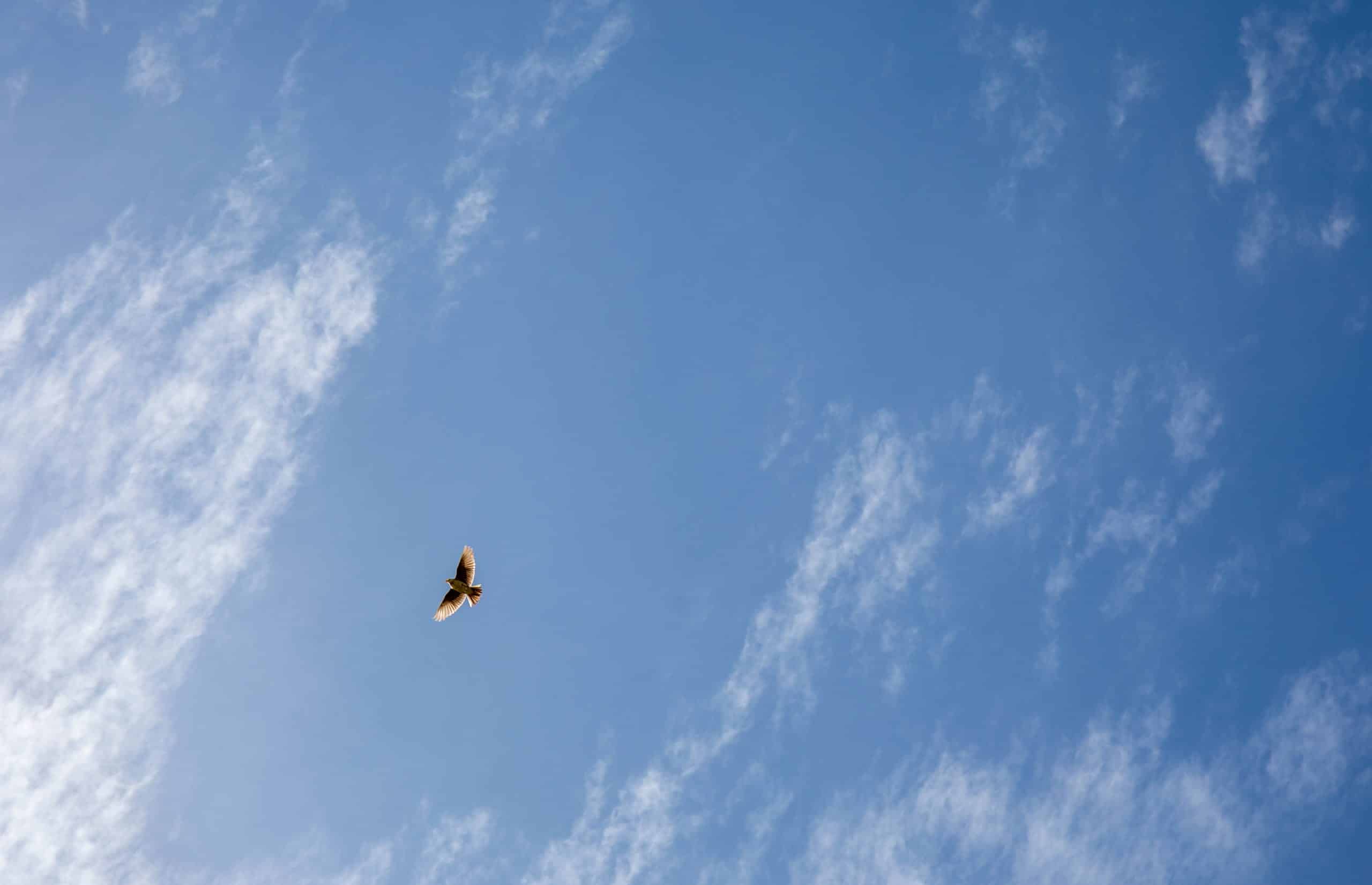
A sonic postcard from Cornwall. The sounds of the sea, beach and cliff top captured during an idyllic morning at Godrevy, as we ventured out for a surf.
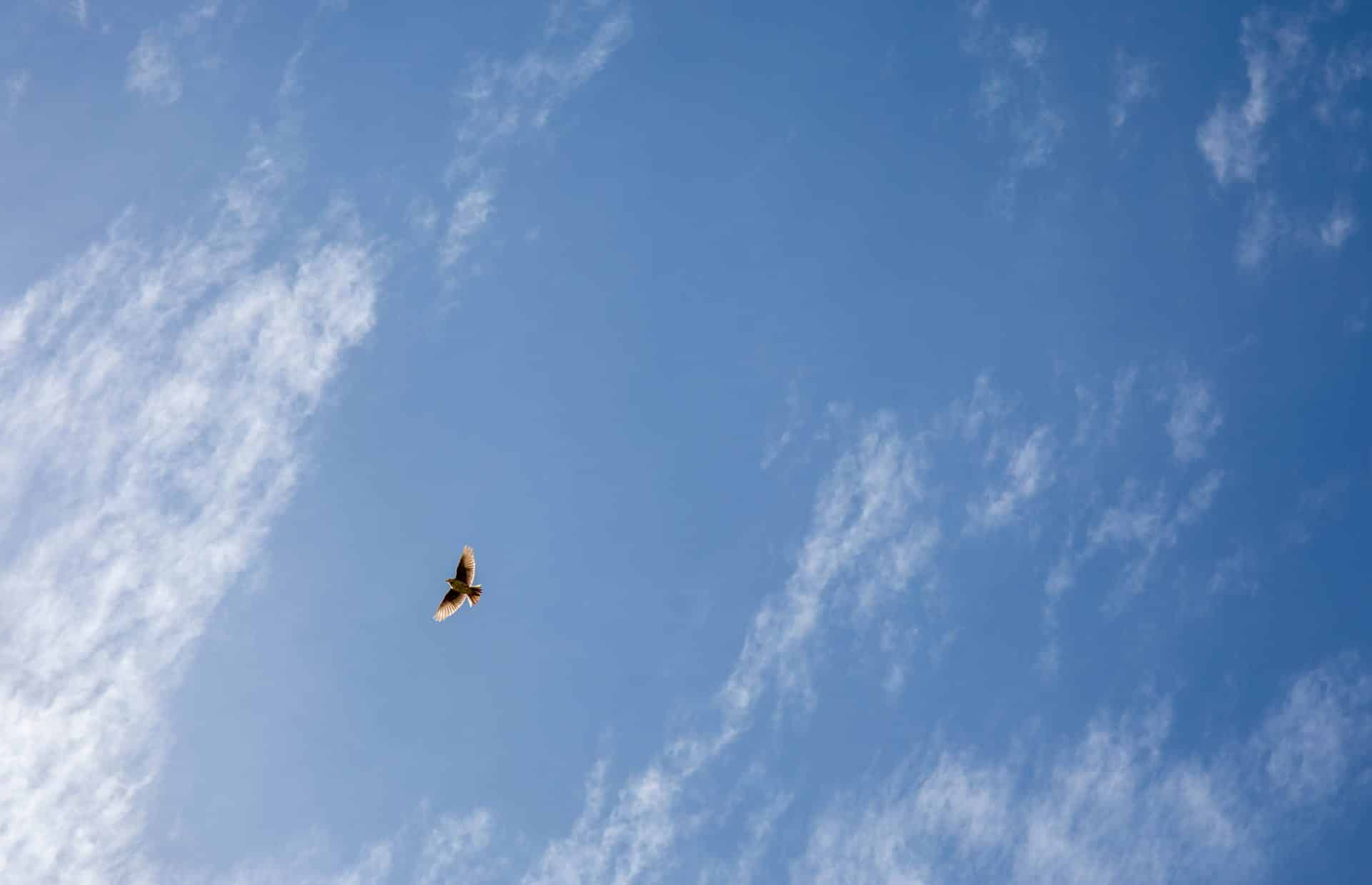
Welcomed by swooping sand martins and the lilting trill of skylarks over the wild fields.
Interested in staying in our most luxurious holiday cottages? Check out our luxury coastal cottages.
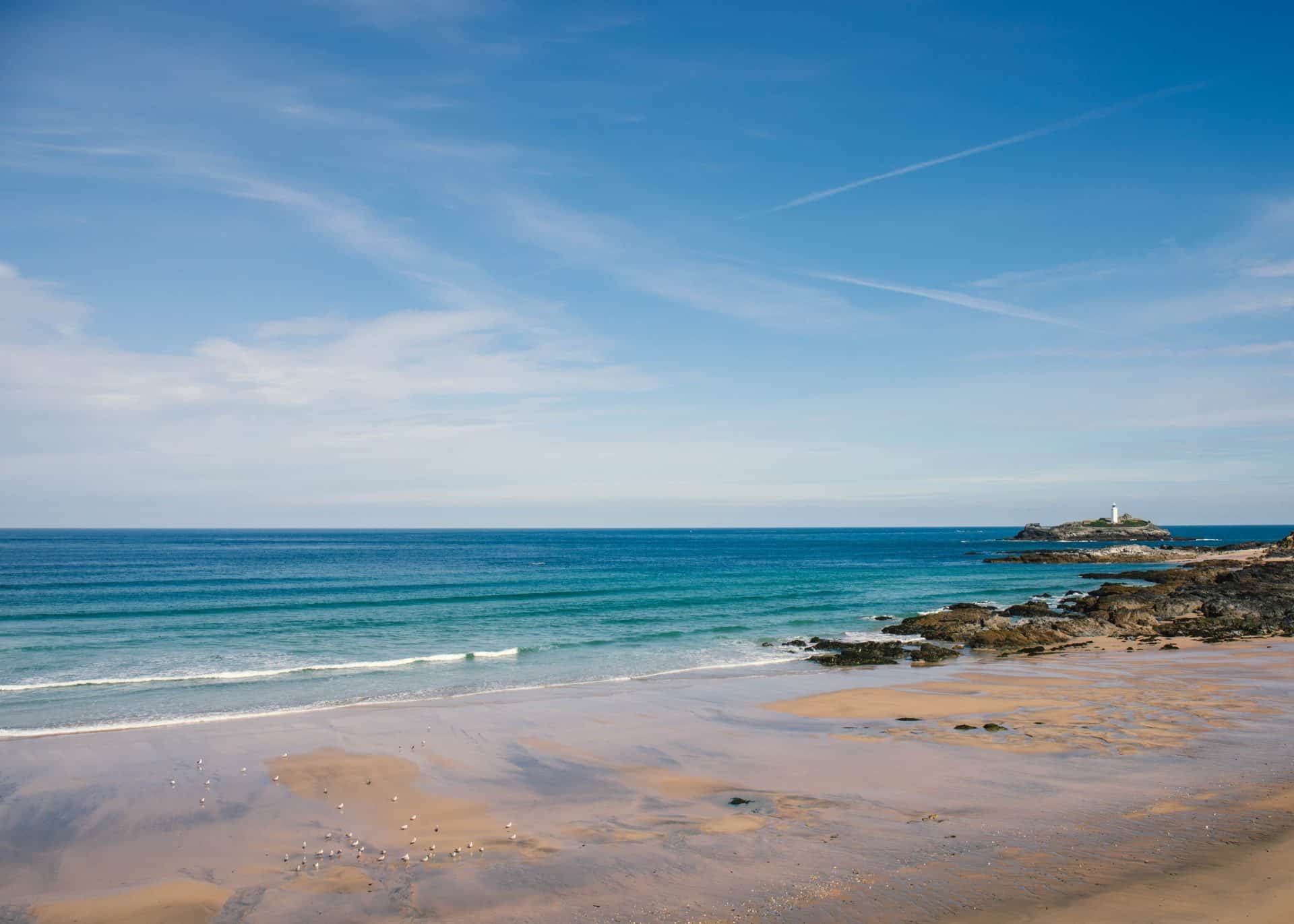
Board waxed, wetsuit zipped and leash attached; inviting waves await…
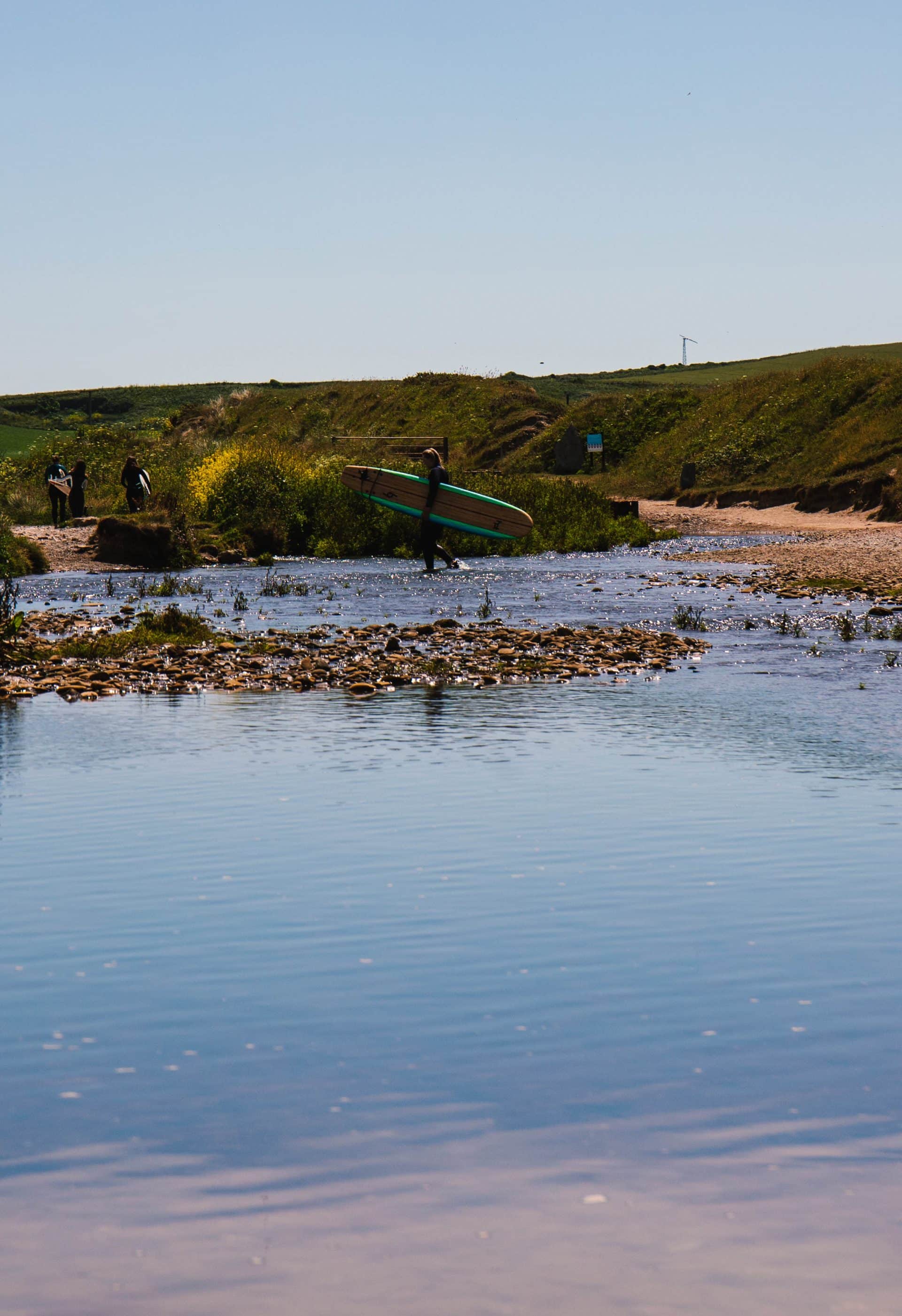
The walk to the beach crosses the Red River as it flows towards the ocean.
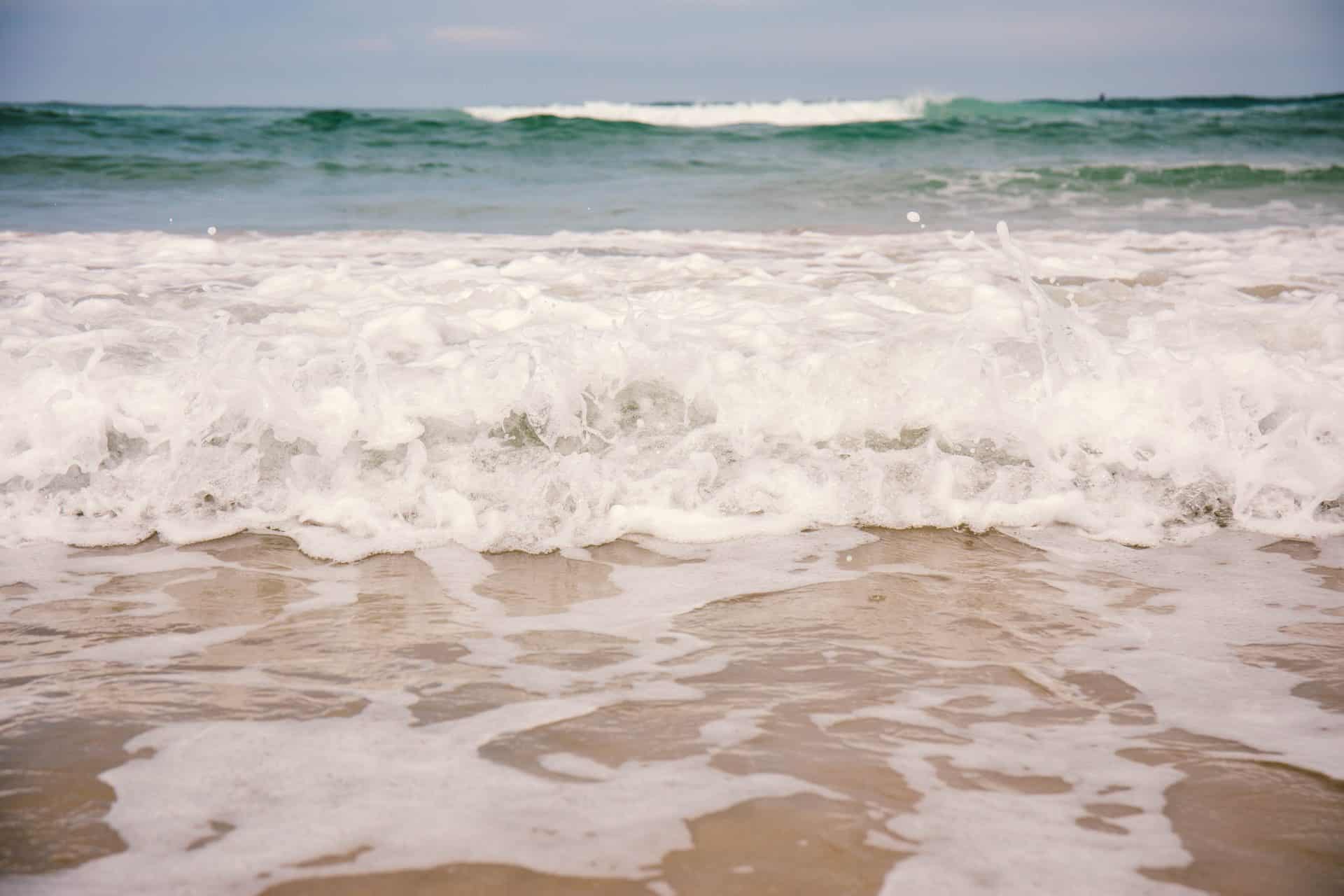
Time to greet the waves….
Looking out to Godrevy Lighthouse and the ocean beyond, the headland at Godrevy, near Hayle, is a wildlife haven – home to ground nesting birds, small mammals, rare invertebrates and spectacular coastal plants – while below lies an oceanic playground, all waiting to be explored.
Discover our bespoke holiday cottages in Hayle, a short drive from St Ives and Pendeen.
Want to learn more about how to make the most of your travel? Read our blog on how to do slow travel.
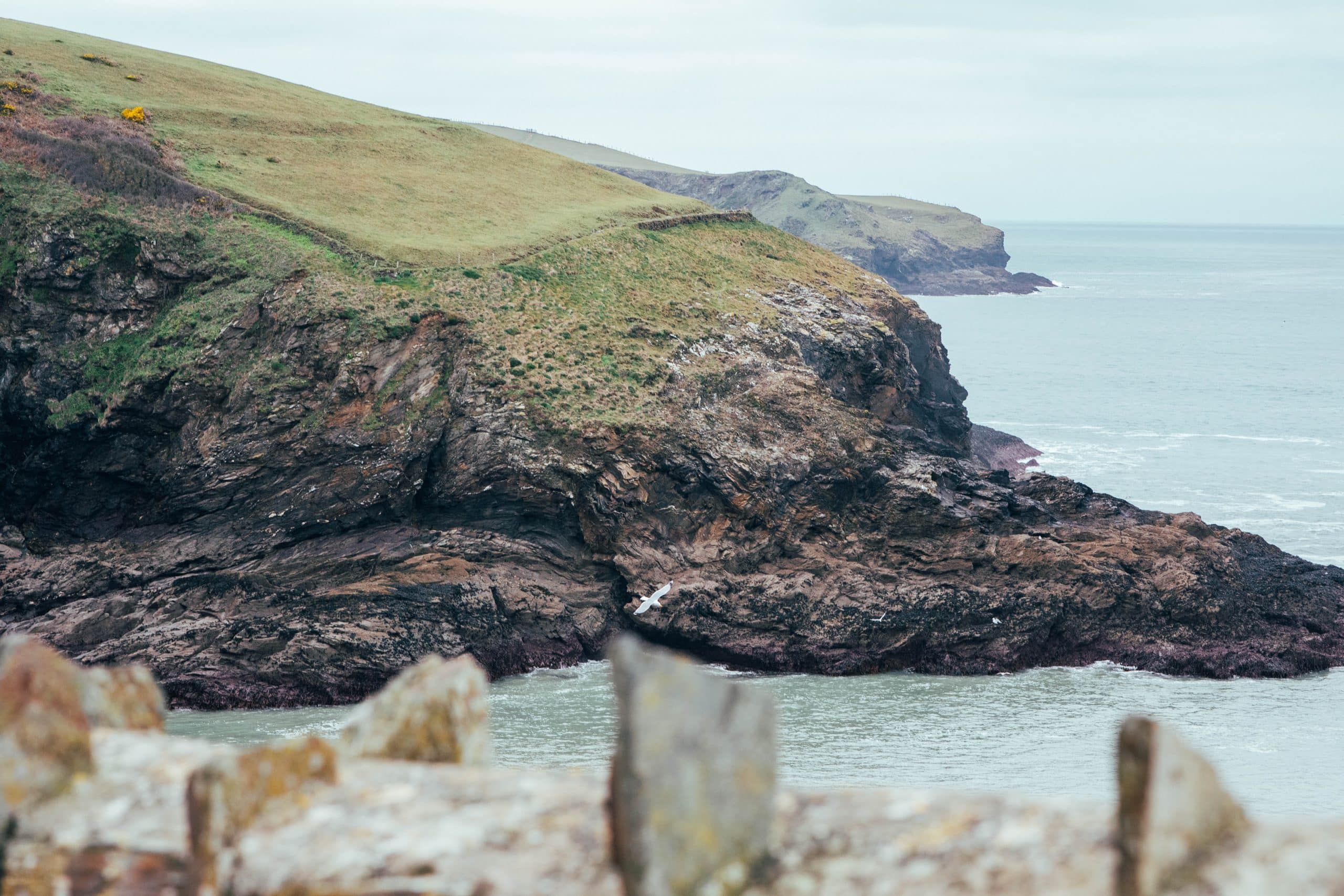
It’s spring and the coastline, from the clifftop fields to the low-tide rock pools, is waking up to the new season. We took a closer look at seaside sights, from the door of one Beach Retreat right down to the shore, and found out more about what spring has in store for coastal adventurers, rock poolers and seasonal menus…
Spring is a rapidly unfolding season by the sea, with nature’s delights unfurling: seasonal flavours ready to savour at dinner and clear blue seas inviting explorers in. While seaweed is starting its fresh new growth, farm produce is welcoming in the sun’s growing energy ready for harvest come May.
To begin, we follow the coast path from Port Isaac to Port Gaverne to find out what spring holds for coastal adventurers Cornish Rock Tors…
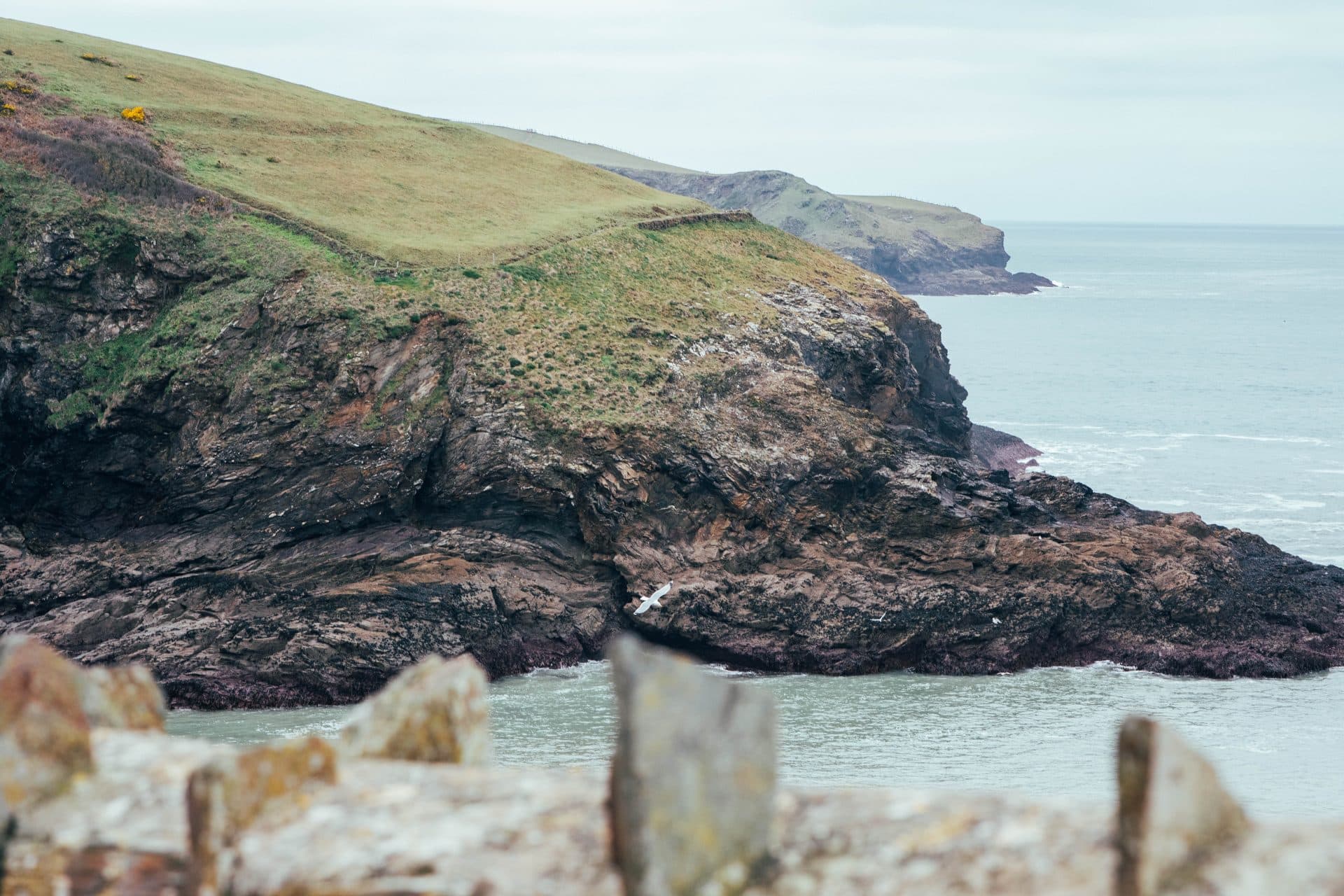
Image credit: Mia Rumble
Ben from Cornish Rock Tors says the team are “a bit like coastal wildflowers, starting to emerge and grow as spring picks up pace”. Winter excursions happen occasionally but March is when everything is checked, in readiness to fully open on the beach-front at the start of the school Easter holidays.
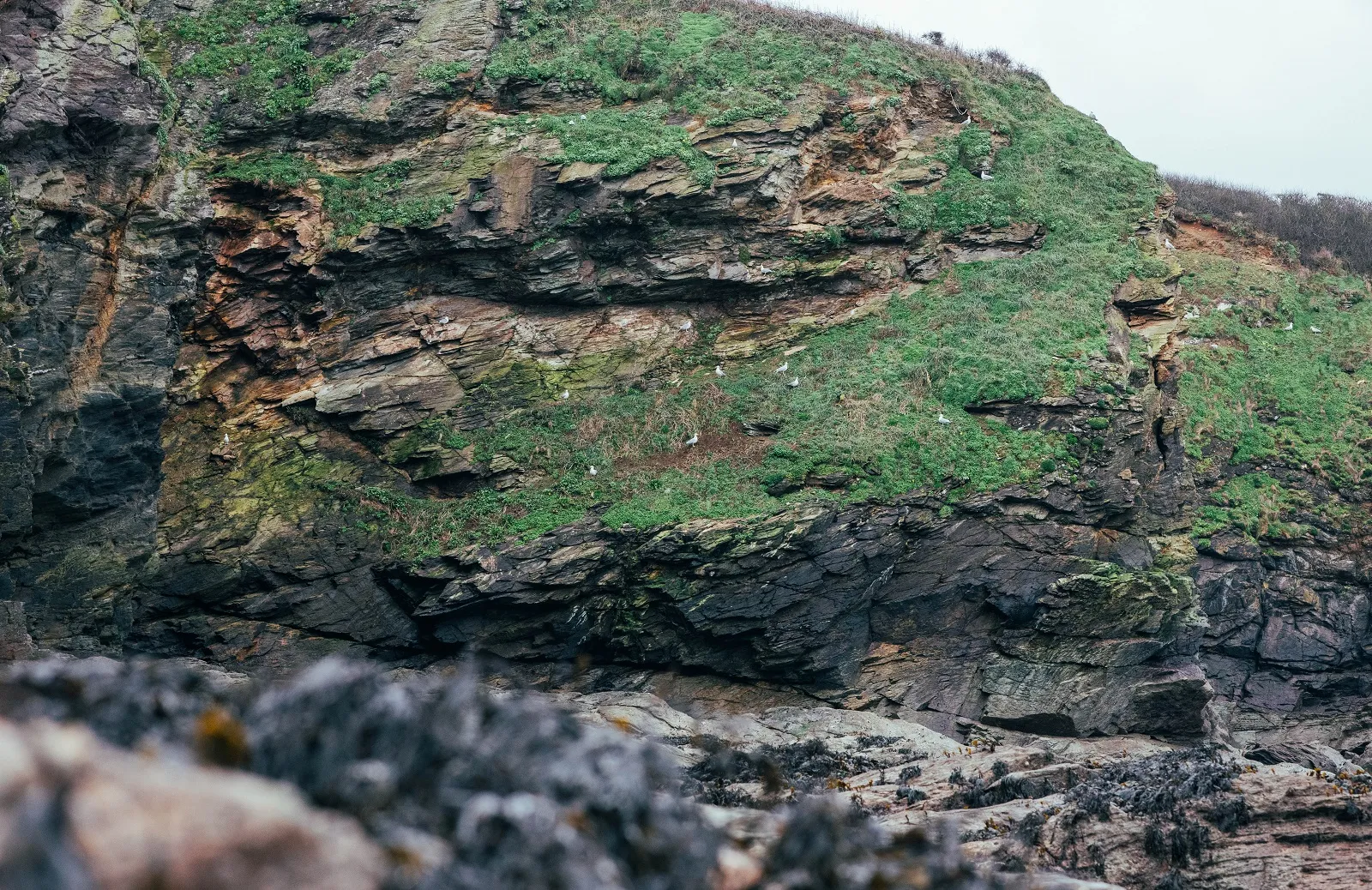
Image credit: Mia Rumble
Based in an Area of Outstanding Natural Beauty on a stretch of Heritage Coast, it’s a wild and unspoiled environment with extraordinary sights in store. “If there is a prolonged period of high pressure and calm weather then the sea in spring can be extraordinarily clear, marking a stark contrast to the winter,” he explains.
By April, wildflowers begin to carpet the edges of cliffs, with thrift, also known as sea pinks, standing out, soundtracked by the sounds of razorbills and guillemots nesting along the coast.
Coasteering with Cornish Rock Tors is to journey through an intertidal world, revealing “multicoloured seaweeds, predatory starfish, beautifully patterned anemones, crabs and common blennys – small fish that can survive out of water and slither between rockpools,” says Ben.
Once out in this rocky world, there’s little sign of human activity, aside from distant movement atop the cliff and the occasional passing fishing boat. Instead, the shifting sea reveals a truly picturesque playground:
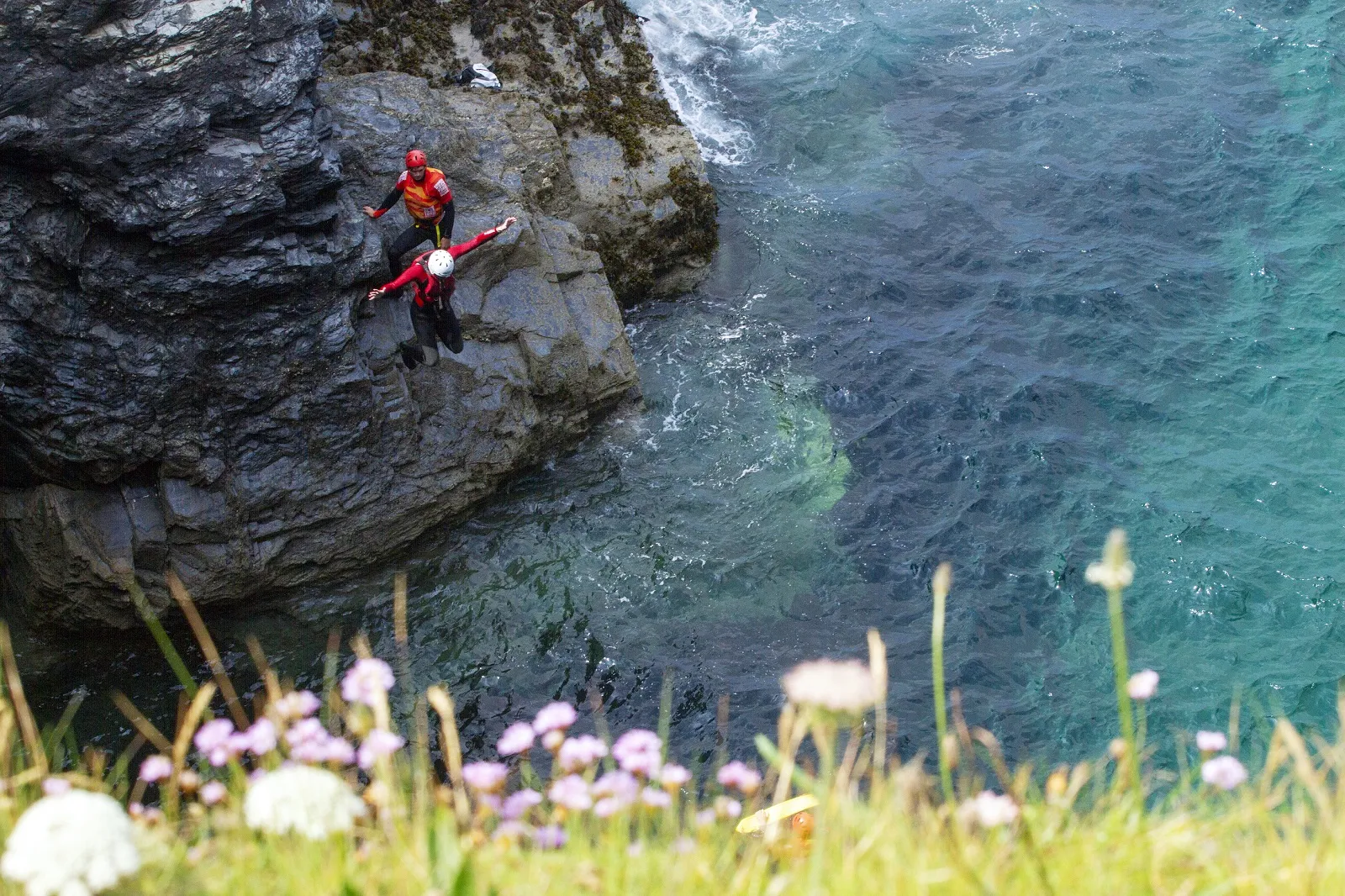
Image credit: Mat Arney, Cornish Rock Tors
“The rocky coast is a playground of jumps, wave features and caves, and because the tidal range here is so large the route can change drastically over the two hours between setting out and getting back – what was a one meter ‘introductory’ jump at the start of the session can be much bigger a few hours later if the tide is dropping,” he says.
“If we get a period of prolonged high pressure, as has happened a few times in the last few years, the clarity of the water is incredible and you can look over the side of your kayak and see many meters down, all the way to the seabed below,” says Ben.
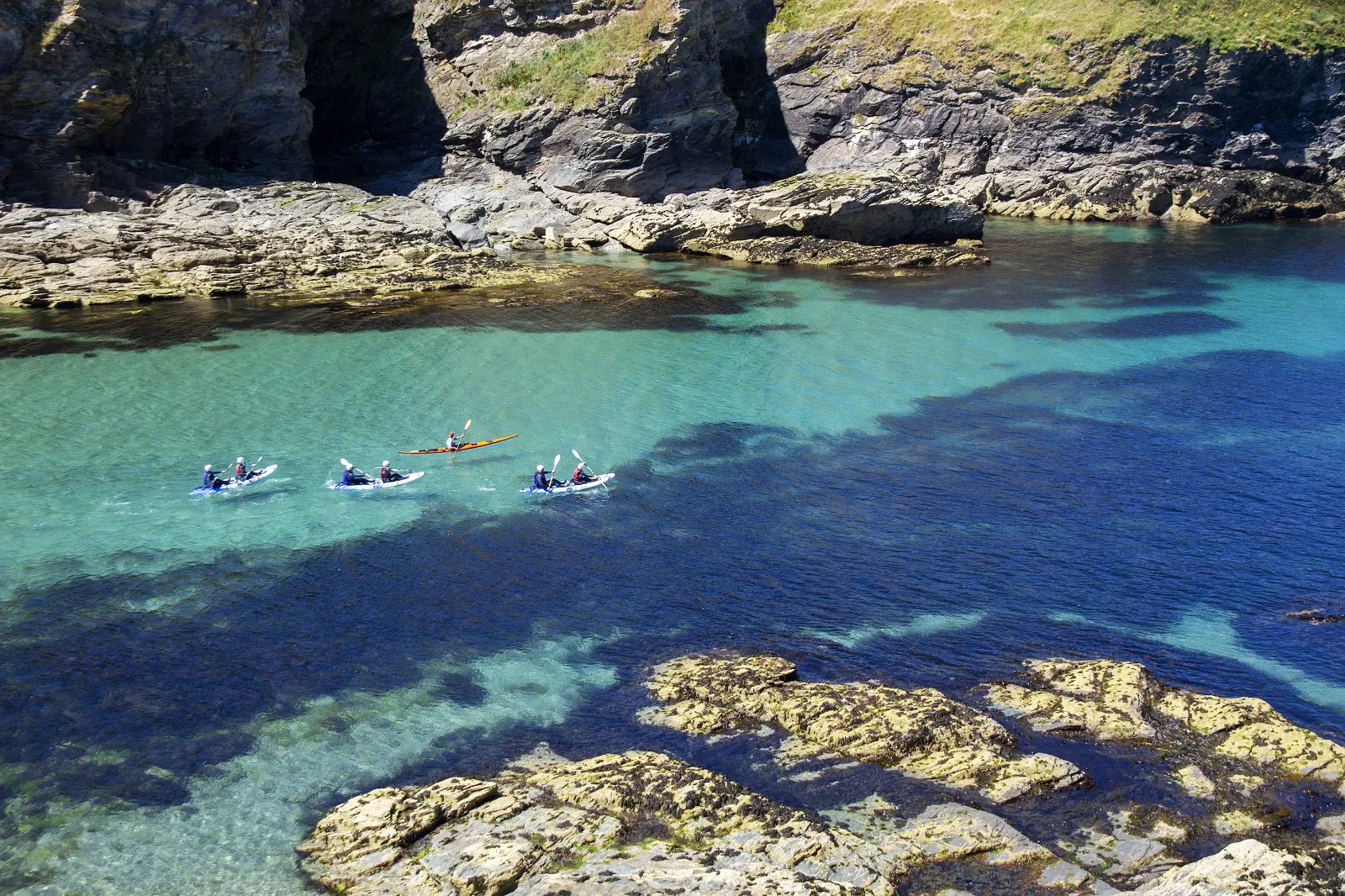
Image credit: Mat Arney, Cornish Rock Tors
A short paddle from the shore reveals respectfully distant views of seabird nesting sites, and kayak trips often take in the unique view of the harbour at Port Isaac from sea.
“Beyond that, there is a beach that is only exposed at low tide and that it is impossible to get to any other way than by sea kayak or boat. In spring we often take groups there to enjoy their own little private beach before paddling back to Port Gaverne,” he adds.
The dynamic weather along the coast any time of year means booking in advance for any activity is best, advises Ben; if the weather or sea conditions change for the booking time, a different weather window can be found to head on out.
“Every two weeks, all year round, we have spring tides…It’s so much better than other times because these rock pools are home to species that wouldn’t be able to live further up the beach”.
While the tidal flux along Port Gaverne’s rocky surrounds creates an ocean playground, each day all along the Cornish coast – north to south – the tides are revealing hidden habitats to discover, with spring quite possibly the best time of year to go on safari there, says Dr Ben Holt of The Rock Pool Project:
“Rock-pooling is all about the tides; it’s the only reason rock pools exist. So it has a really big impact on what you can find.
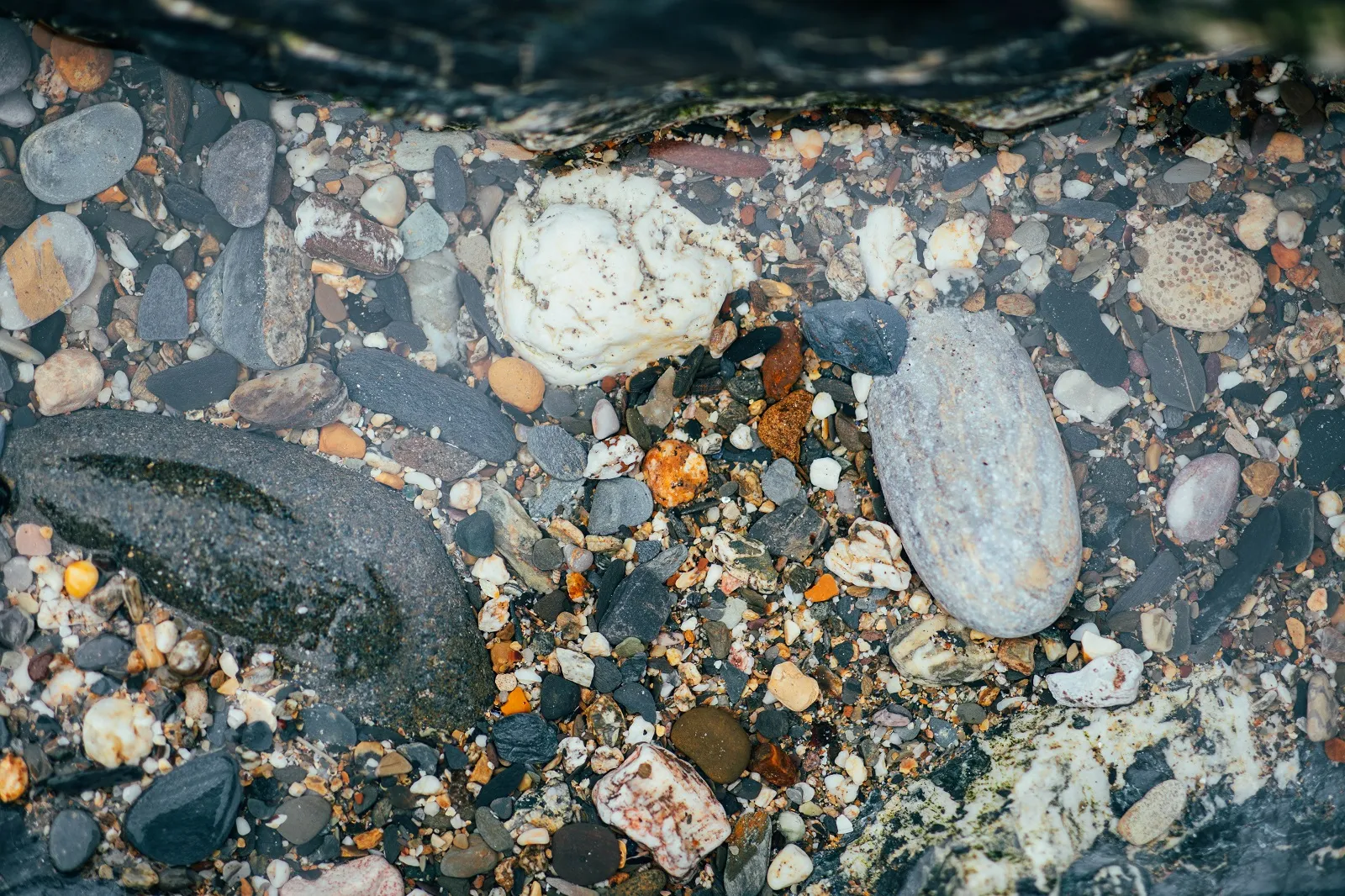
Image credit: Mia Rumble
“Every two weeks, all year round, we have spring tides when there’s either a full moon or a new moon. It’s when the tide goes out the furthest. It’s so much better than other times because these rock pools are home to species that wouldn’t be able to live further up the beach as they wouldn’t survive with being out of the water for too long.”
Experience the mesmerising allure of the sea with the sensational sea, where each moment is immersed in the beauty and tranquillity of coastal living.
This abundant marine environment, hidden for much of the day, is bright and bustling as spring shoots into life. The 350 different seaweed species in the UK waters are more vivid than ever, growing fresh fronds and leaves, while, mirroring the terrestrial life cycle, it’s a time for laying eggs and carrying young.
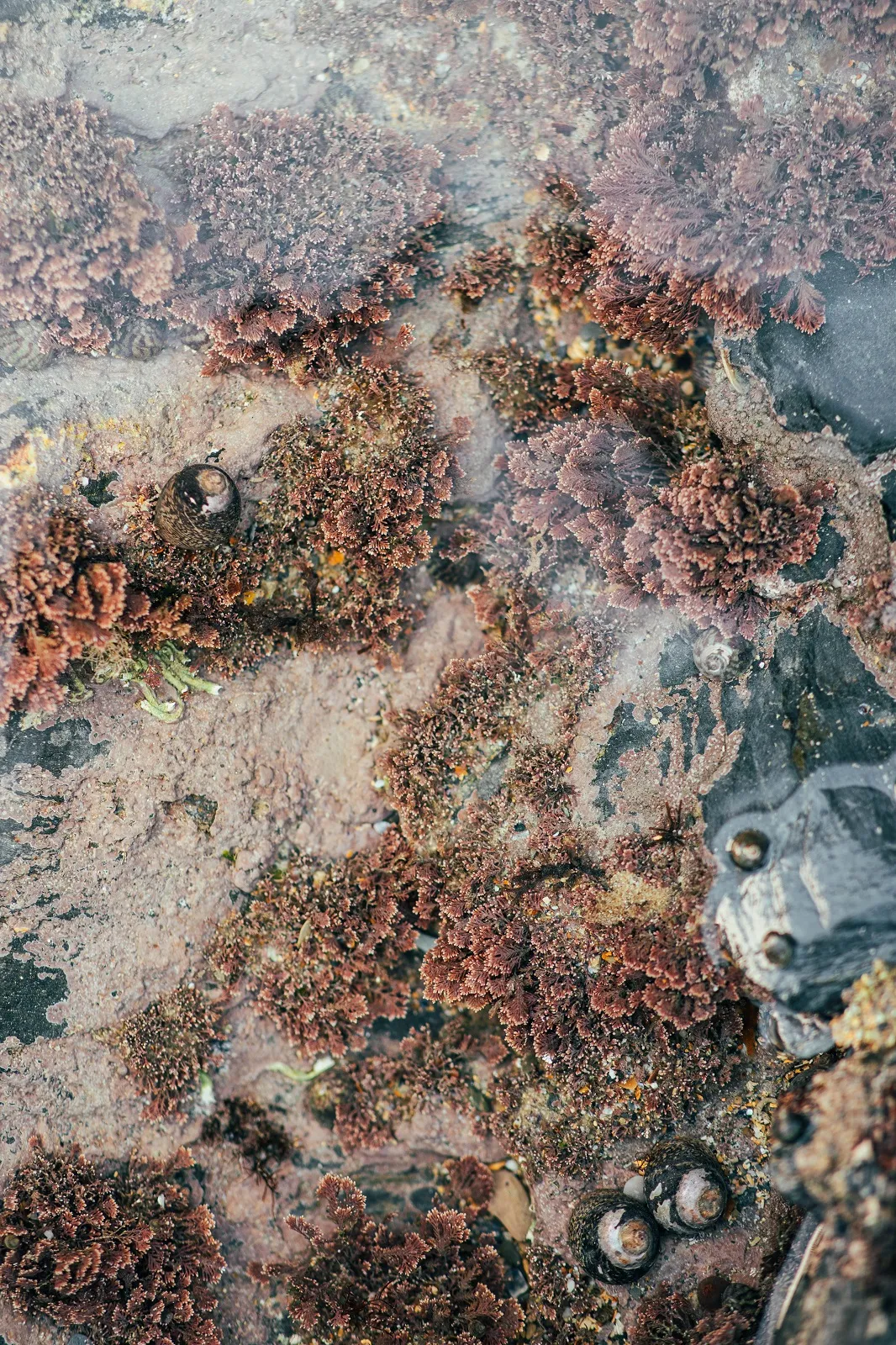
Image credit: Mia Rumble
“Pipe fish are in the same family as seahorses, and the male pipe fish carries the eggs,” says Ben.
“Female crabs carry their eggs on the underside of their body. They can be carrying six or seven thousand tiny eggs until they’re ready to be released. Some rock pool creatures reproduce at other times of year but spring is when there’s a higher rate of this behaviour.”
Spring tides – which fall to their lowest in the middle of the day in Cornwall – get their name because spring is when these tides are at the greatest range, their lowest and highest; although, autumn is the other season of very high and low spring tides.
As well as checking the tide times for the best rock-pooling opportunities, Ben’s tip for any intrepid explorers is to make sure you have the right footwear. Flipflops and bare feet don’t make for the best foundation on the slippery, sometimes sharp rocks out on the farthest strandline. In colder conditions, wellies are great, and a pair of old trainers work well for safely exploring in warmer temperatures.
To get searching, grab the guidebook and a camera – to snap any mystery finds for later identification.
The Rock Pool Project runs community projects around Plymouth and Falmouth. You can also book a guided rock pool safari with the team throughout the year.
Looking out to St Michael’s Mount standing tall in Mounts Bay near Marazion, the team at Trenow Fields are tending to their produce, dictated by the season on land that’s managed to regenerate the habitat and boost biodiversity.
Ready for harvest from May, flavourful salad leaves, herbs and edible flowers from Trenow can be found in restaurants all over west Cornwall, and further afield, from Argoe in Newlyn to The Crumb, Penzance, to Source Kitchen in St Ives.
Thinking about staying in St Ives? Have a look at our luxury St Ives holiday properties.
Chefs also request ingredients from the wilder fringes of the farm, emerging from rocks and sand as spring gets going.
“There’s wild rock samphire, foraged at the Cove, which is fantastic in curries or sautéed with eggs. And nettles – great steamed with poached eggs on sourdough toast, or as a creamy nettle soup with lashings of double cream,” says Trenow grower Mark.
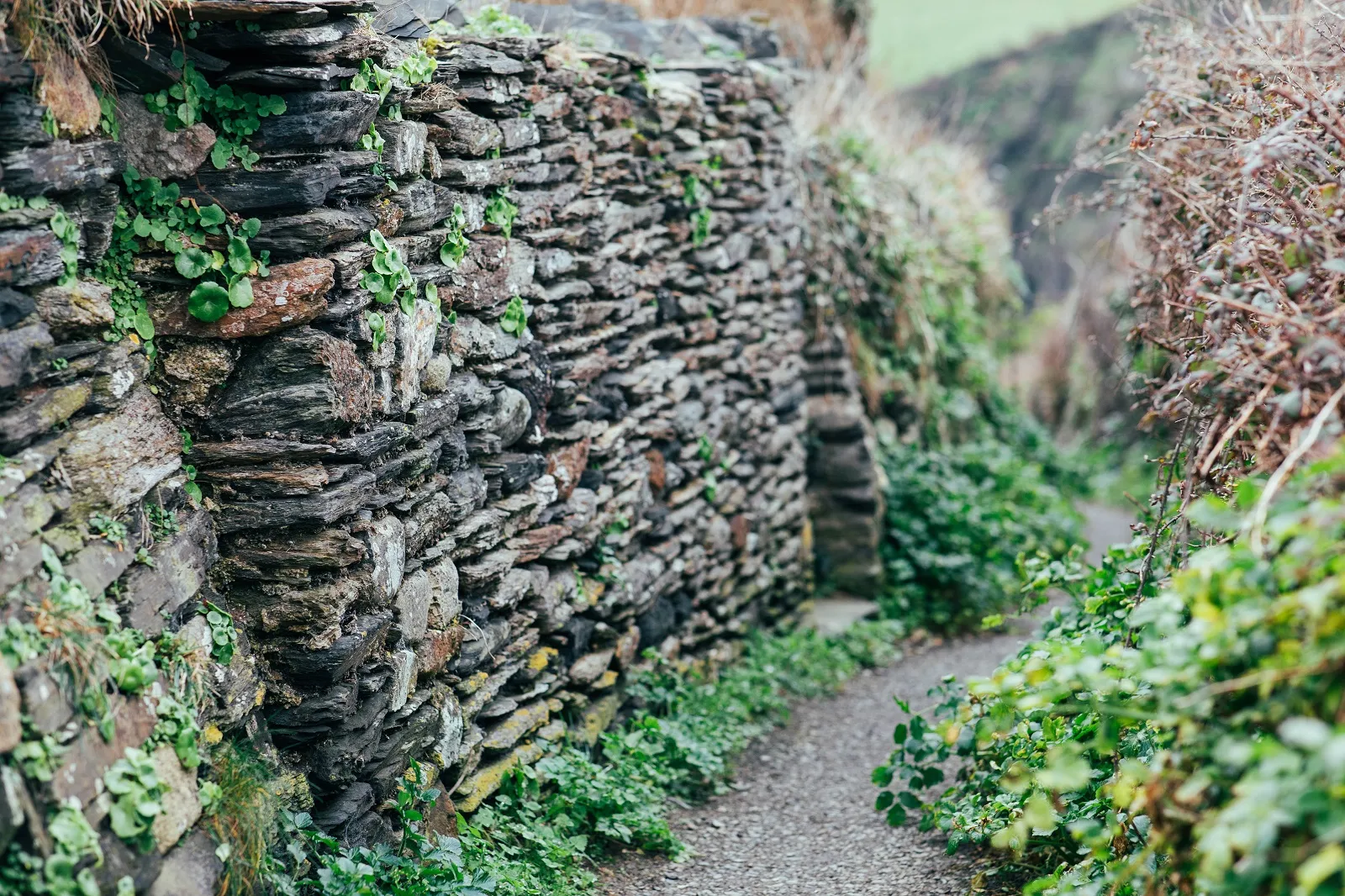
Image credit: Mia Rumble
Not on the Trenow produce list, but abundant not far from the shoreline, Mark recommends keeping a lookout for navelwort: “a cucumbery succulent leaf that will be all over the hedges”, and mallow leaves: “an excellent ‘poppadom’ when baked in the oven for a minute.”
While not open to the public, Trenow’s essential oils – produced from the lavender grown on the farm – are available online, and farm shops and veg boxes stock their seasonal sustenance.
To stay by the sea in spring is a chance to spot all that is unfolding along the shoreline from your door to the shore, whether fresh shoots served up at dinner, rare rock pool discoveries or tidal thrills in the clearest of seas.
A place to huddle up for two or a space for all your loved ones to gather and celebrate, where will you explore from #doortoshore? Find your Beach Retreat below.
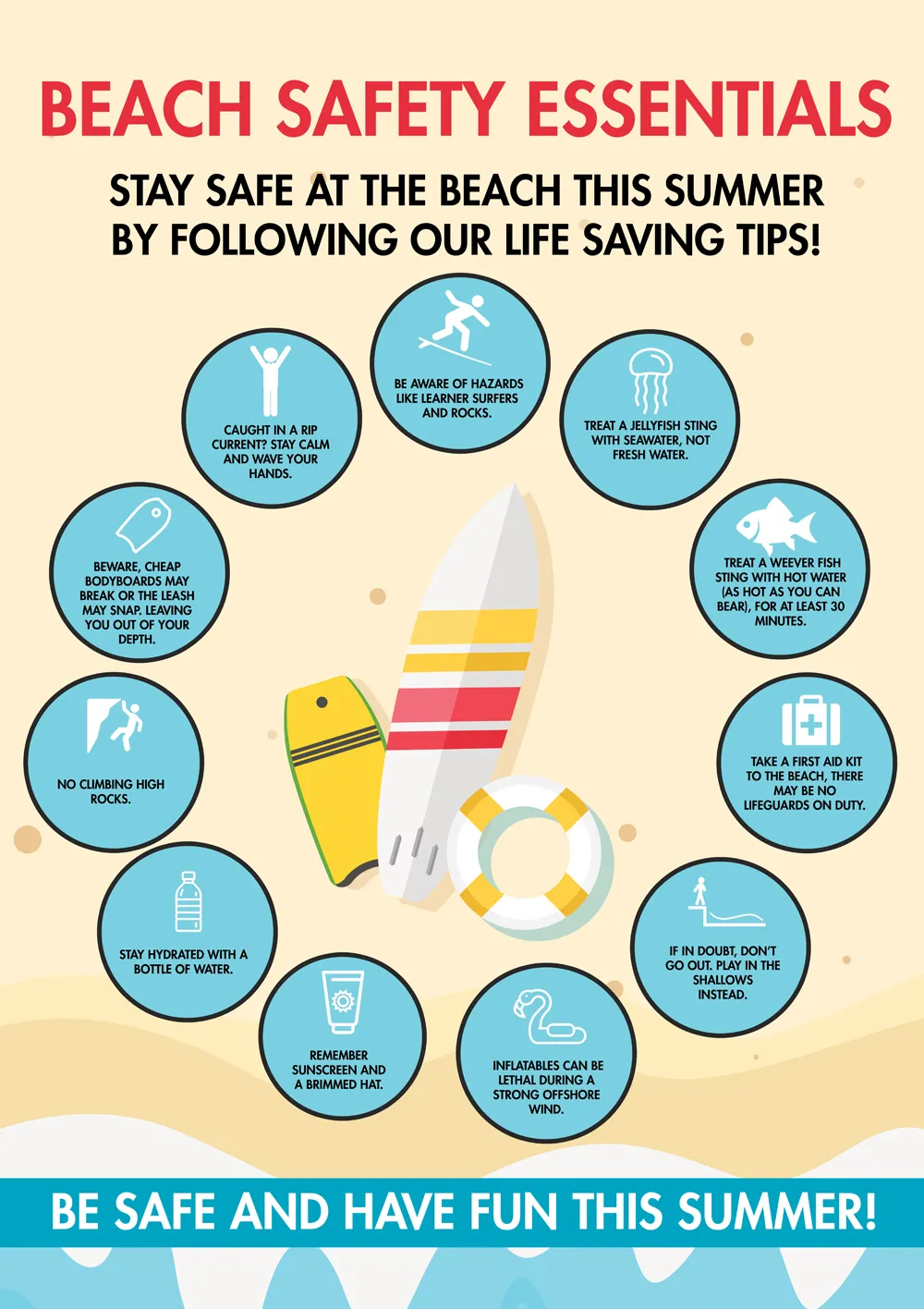
Here’s what you need to know if you’re planning a trip to the seaside…
Want to stay in a luxury holiday house with a view of the sea? Check out our cottages with sea views.
We hope you’re excited for your stay by the sea. While Cornwall is generally a safe place, each year there are accidents on our coastlines.
To ensure this doesn’t happen to you during your time with Beach Retreats, Newquay Activity Centre have produced some beach safety guidelines for you and your family to follow. Their instructors are fully trained lifeguards and work closely with the RNLI.
Save the image below to your phone and share with your loved ones ahead of your holiday to Cornwall.
Stay next to the sea with our other holiday lets in Perranporth!
You may see a flag with a red stripe on top and a yellow stripe underneath. There will be two of these red and yellow flags on the beach, and these mark out the area that it is safe to swim between. This area will be covered by lifeguards.
Mark Kelly is the Beach Lifeguard Trainer and Assessor at Newquay Activity Centre and says:
“The beaches are busy, and we’ve experienced a big swell recently that has already sadly caused fatalities and rescues. We urge surfers and swimmers to be aware, check the weather, tide and forecast.
For small children, there is also fun to be had in the rockpools and paddling in the shallows. We really hope that the RNLI are able to fully patrol the beaches soon, but we want people to understand how dangerous the sea can be and to stay safe at the beach”.
Discover more safety insights from the RNLI & stay safe at the beach with essential knowledge of natural signs at sea.
If you’d like to participate in a safe ocean activity this summer under the watchful eye of a trained lifeguard, or you would like to train as a lifeguard, please contact newquayactivitycentre.co.uk
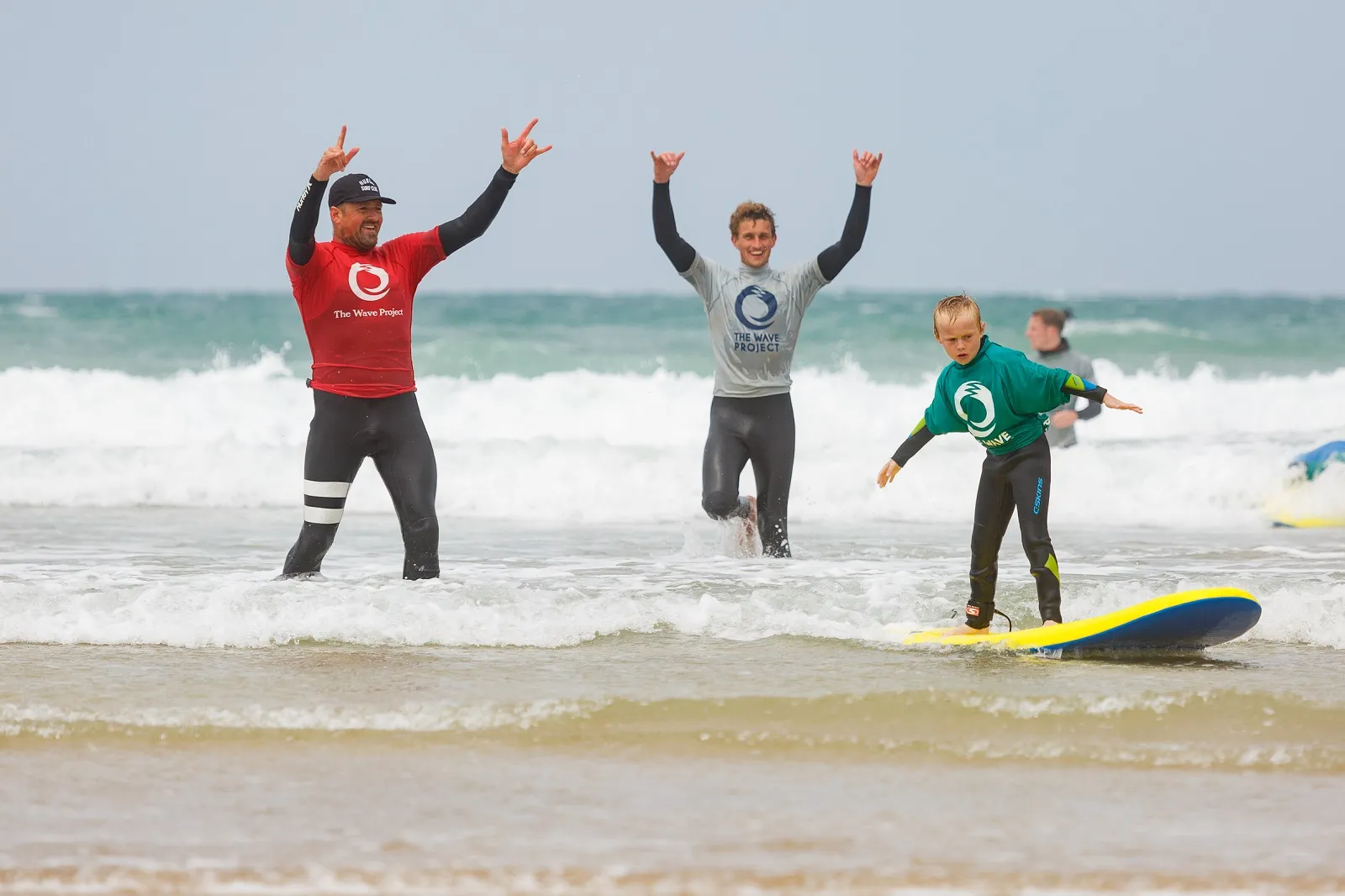
We’re proud to announce that we’ve recently become a sponsor of The Wave Project, a nationally-reaching surf therapy charity which was founded in Cornwall.
Our monthly donation will support projects in the South West, and allow the team to continuously respond to situations quickly and efficiently, ensuring that young people have help and support when they need it most.
This can include anything from paying for transport to and from the sessions, funding one to one adaptive surfing lessons, and waiving the Surf Therapy referral fee for young people who might otherwise fall through the gaps. Read more about the fantastic work The Wave Project does below.

With projects across Cornwall, but also extending across the UK, The Wave Project is a lifeline to young people across the country.
Supporting children and young people who experience a range of physical and mental health issues, social deprivation, or social isolation, the Wave Project facilitates a range of activities, including year-long surf therapy courses which aim to help participants build self-esteem, develop resilience, and make friends.
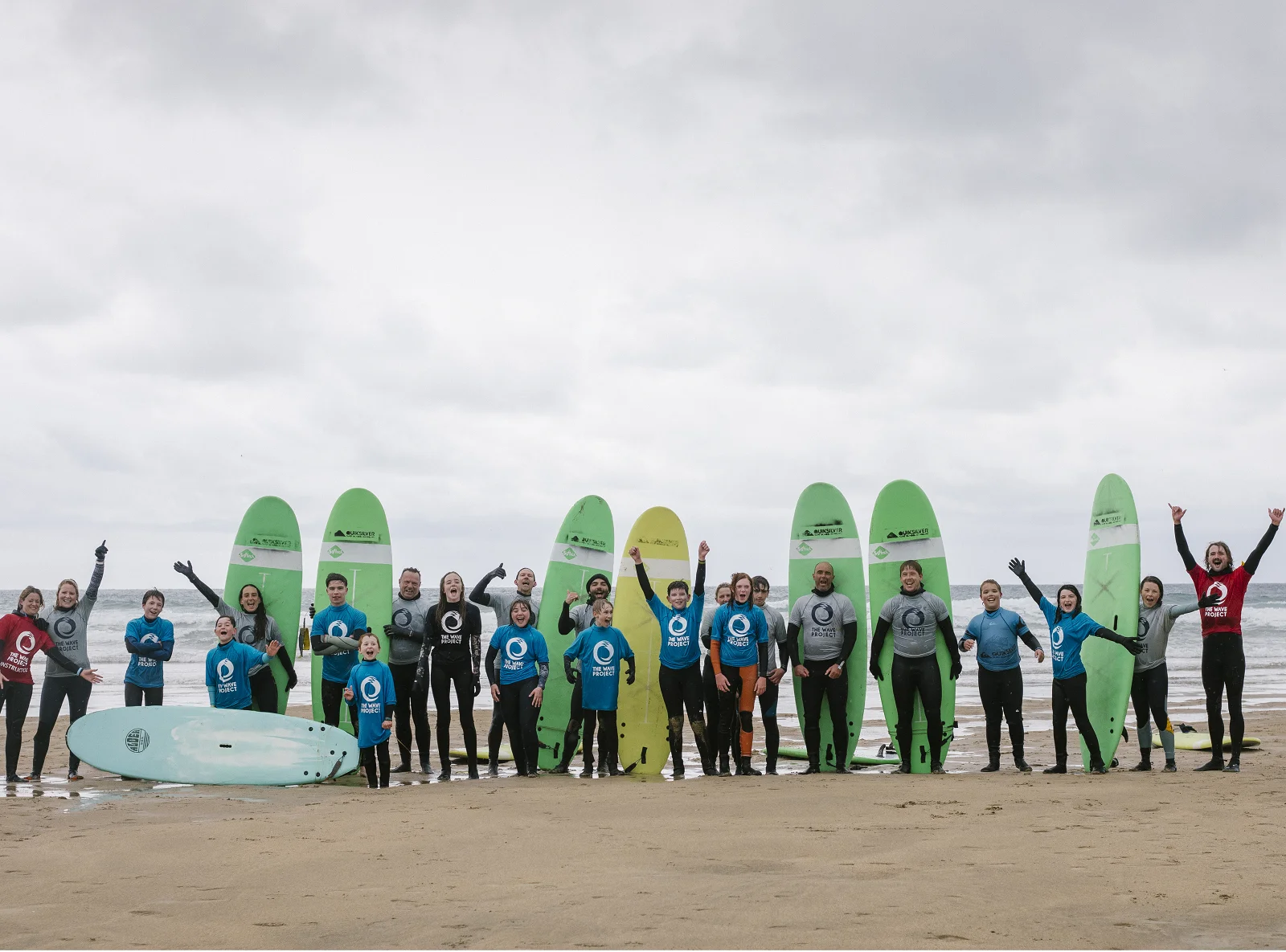
A Surf Club is in place for those who have participated in the Surf Therapy courses, along with a Beach Therapy Programme which blends surf therapy and education to help pupils who have found engaging in school life a challenge to get more inspired and motivated to learn.
Firm believers that surfing is for everyone, the Wave Project has also acquired the necessary skills, training and specialist equipment to deliver safe and enjoyable surf lessons for those with physical disabilities from its Adaptive Surfing Hub in Croyde, North Devon. Later this summer, they will also start offering adaptive surf sessions from Watergate Bay in Cornwall.
The nationally award-winning surf therapy courses are free of charge for participants and their families. This means that the charity wholly relies on donations from its supporters to fund the activities, which are run by a team of dedicated volunteers.
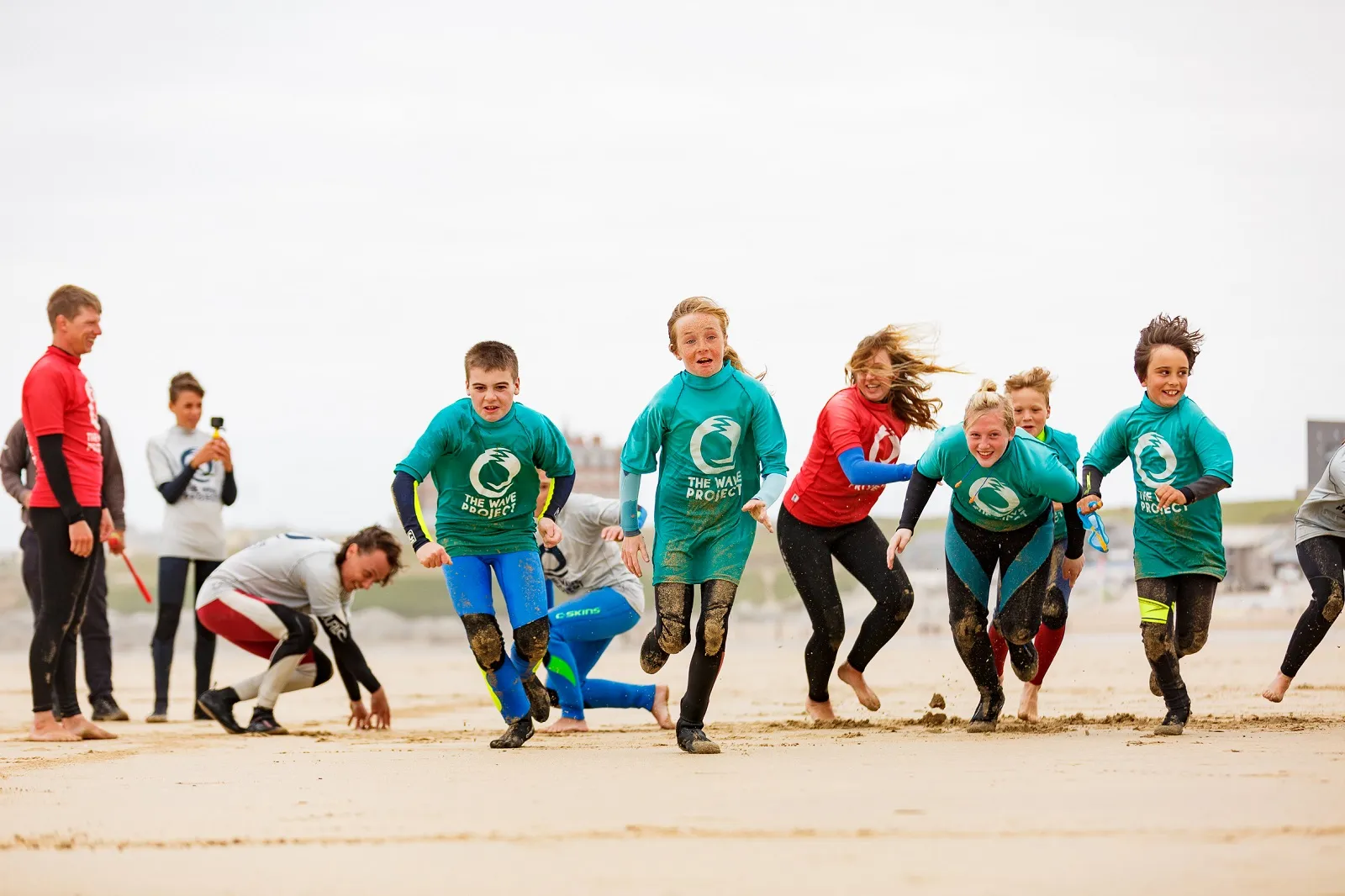
Newquay project co-ordinator Fred Andrews said: “We’re immensely grateful to supporters like Beach Retreats for their donations, which allow us to run the activities our communities across the UK have become so reliant on over the last ten years.”
Watch a video on the brilliant work The Wave Project is doing to support children and young people below.
With over 240 properties on Cornwall’s coast, the beach is in our DNA, so it feels only natural that we support a longstanding Cornwall-founded charity like The Wave Project, helping them to deliver lifechanging therapy and courses to young people in need.
Andy, our MD said: “We’re proud of our coastal heritage and want to give back to the community, supporting young people’s physical and mental health, and driving awareness of water safety.
“We’re very excited to see how this partnership unfolds, and we can’t wait for our teams to get stuck into volunteering for this fantastic charity.”
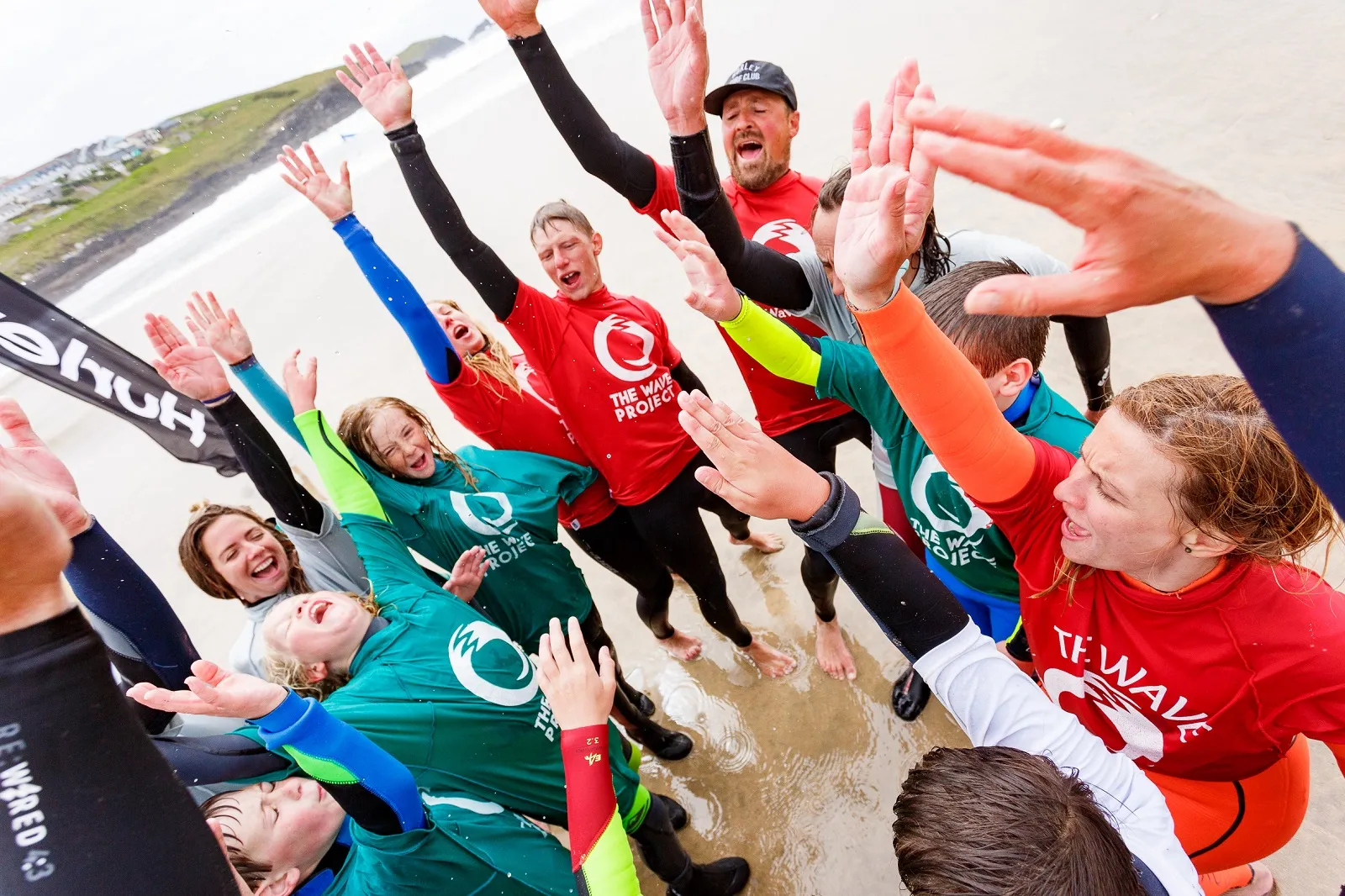
For more information about the work the Wave Project is doing across Cornwall and the UK, visit their website.
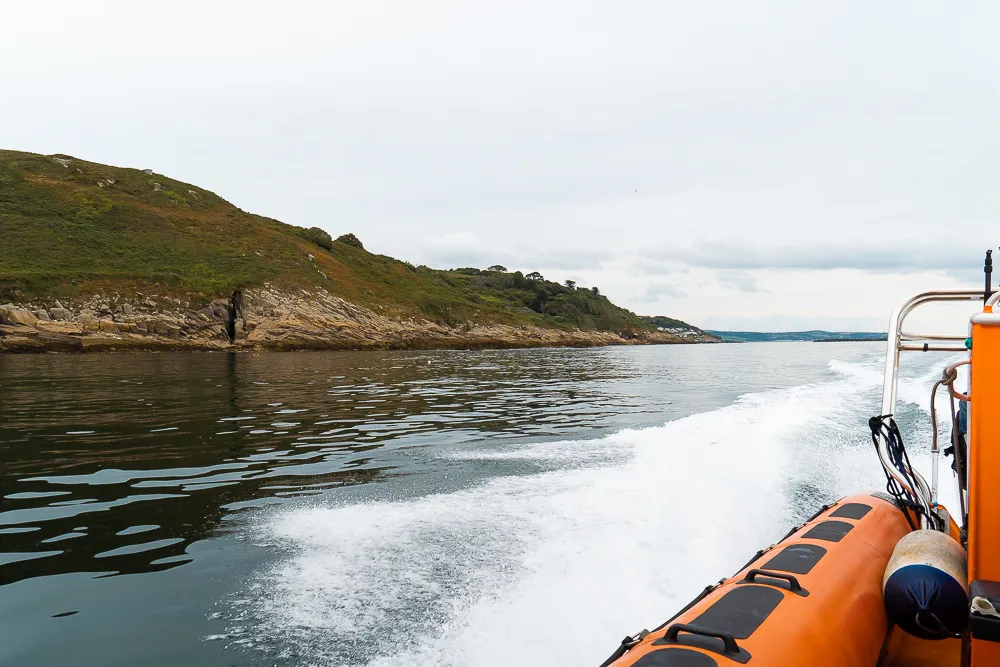
There’s a world of wildlife out there in the untamed coastal waters of Cornwall. Finding it requires patience, luck and respect. We struck out by boat in search of this natural wonder…
Still, transparent water, jagged, rocky cliffs, open, stretching skies: our view from Coast Boat Trips’ lively rib certainly delivers. But would the wildlife?
Embarking from Penzance we zip out to sea and towards Land’s End in search of marine animals in their natural habitat.

Fast and fun, the boat bounces west to pass the harbour town of Mousehole and the dramatic cove at Pedn Vounder, before capturing a majestic view of the granite rocks where the Minack Theatre lives.
Check out our holiday properties in Mousehole to experience everything the area has to offer.
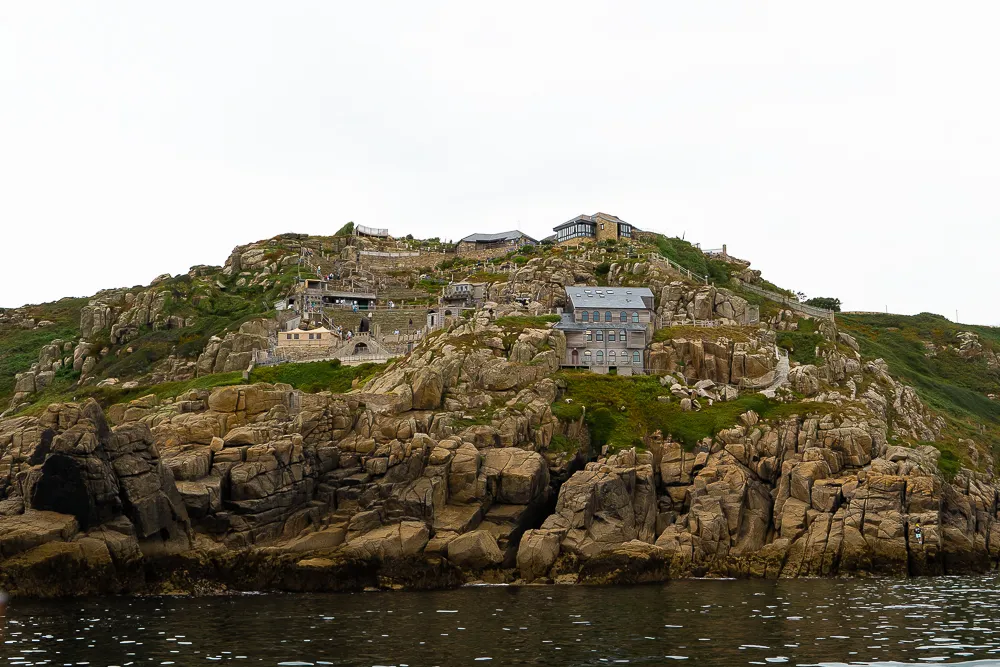
As we swing around the peninsula at Land’s End, we spot a single dolphin emerging from the water about 30 metres away. The captain slows the engine and we wait. Our patience is rewarded. A pod of common dolphins gathers around the boat, jumping from the water. One dolphin comes up close to the left of the boat where we can see it swimming in the clear water.
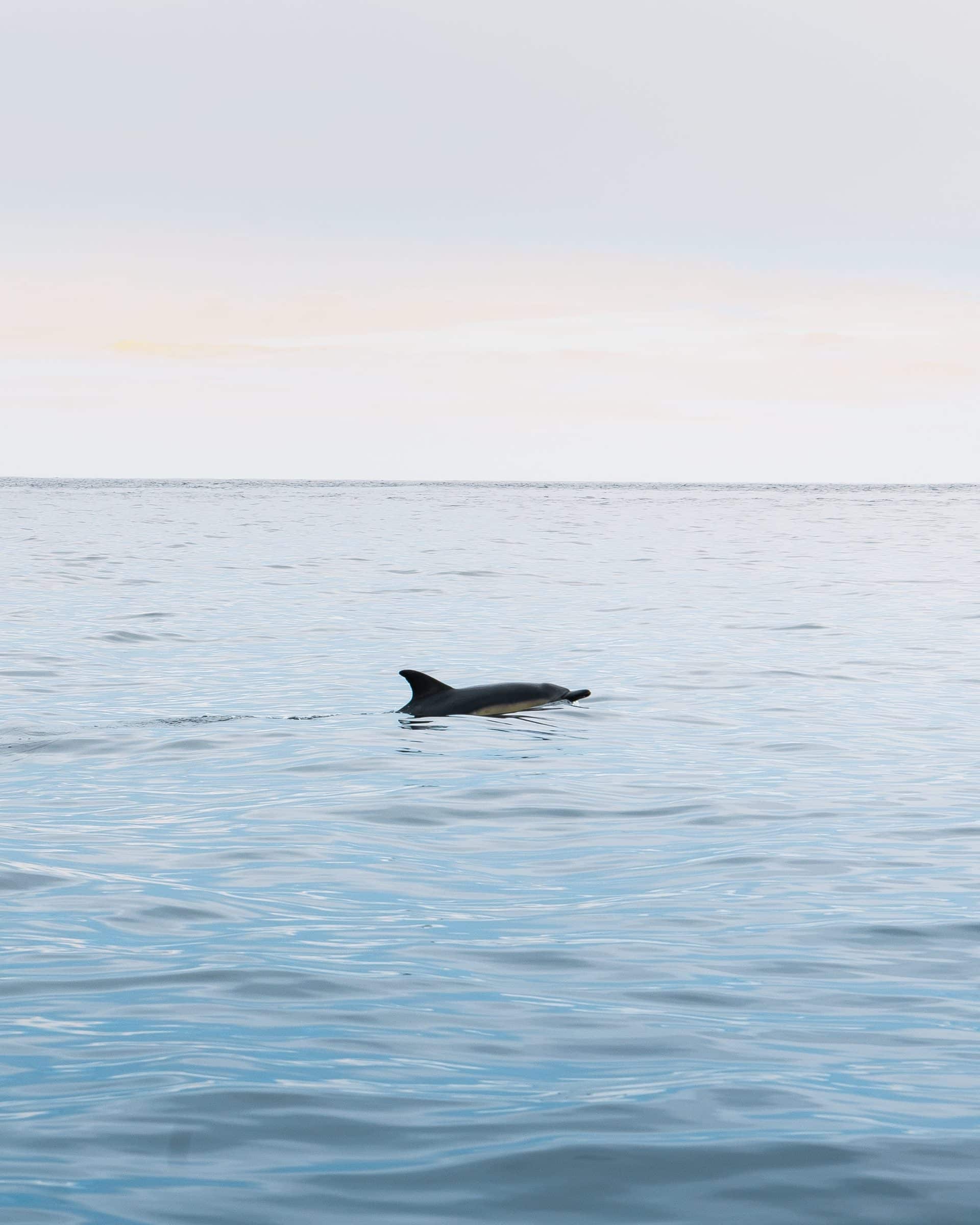
All around the coastline we encounter different wildlife: seals stretched out on rocky outcrops, sea birds swooping and circling, shy porpoises swimming deep and emerging occasionally for air.
As we take in the sights, we get expert commentary on the local history, the marine conditions and wildlife, discovering that dolphins keep swimming even when asleep, slowly bobbing in and out of the water on autopilot.
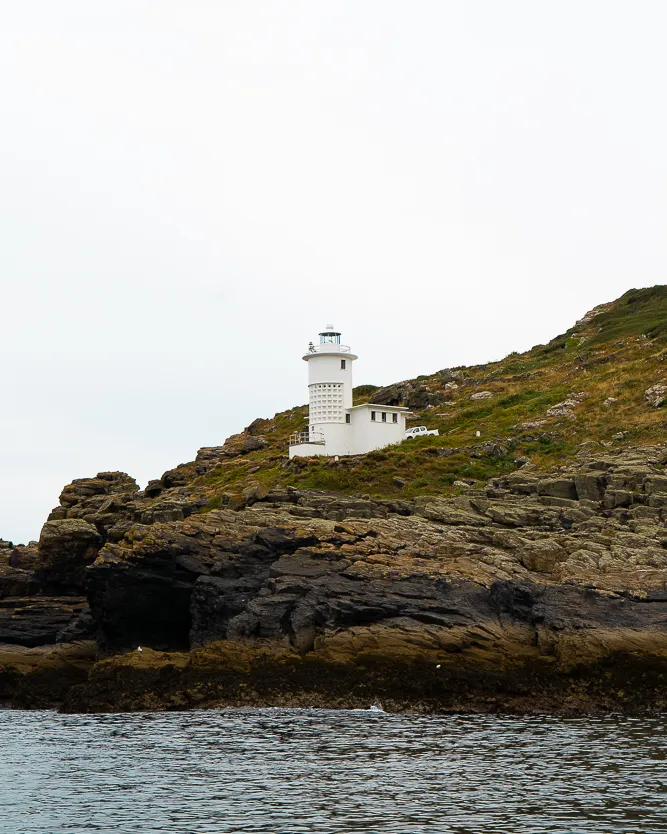
Our experience on the water around West Cornwall was magical and exciting, but how common is it to encounter marine wildlife around the coast?
“Summer and autumn are some of the busiest times for marine wildlife,” says Matt Slater, Marine Conservation Officer at Cornwall Wildlife Trust.
“Common dolphins are becoming an increasingly common sight around our coast; there’s a very high chance you’ll see them. They’re quite small and enjoy swimming in the wake of the bow wave created by a boat.”
Discover adrenaline-pumping adventures and unforgettable experiences with Newquay’s wild activities.
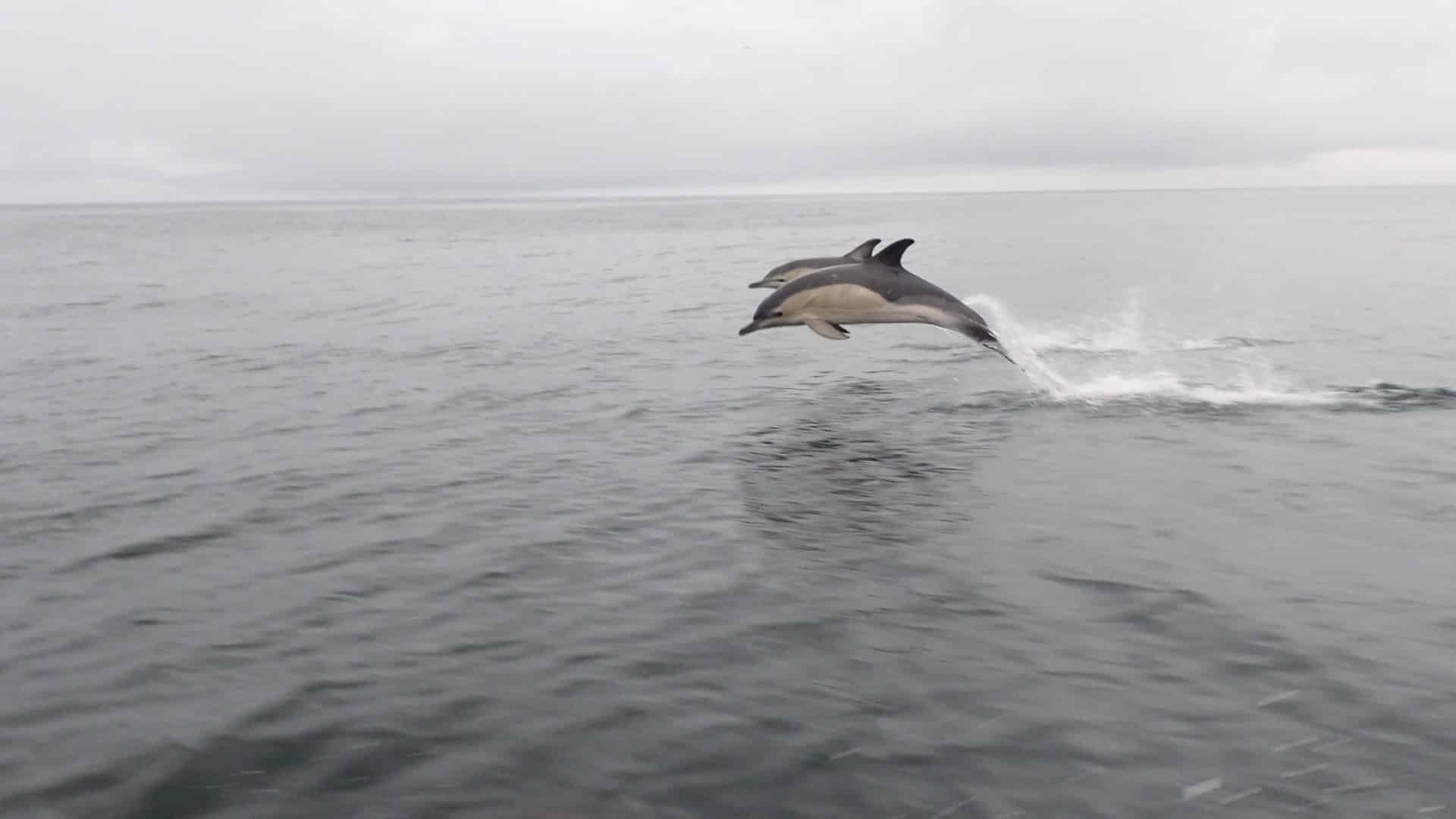
Image credit: Matt Slater
As we found, porpoises, a smaller cetacean, are harder to spot. Matt says, like dolphins, porpoises are also likely to be seen in summer and autumn; although, sightings are also reported in spring.
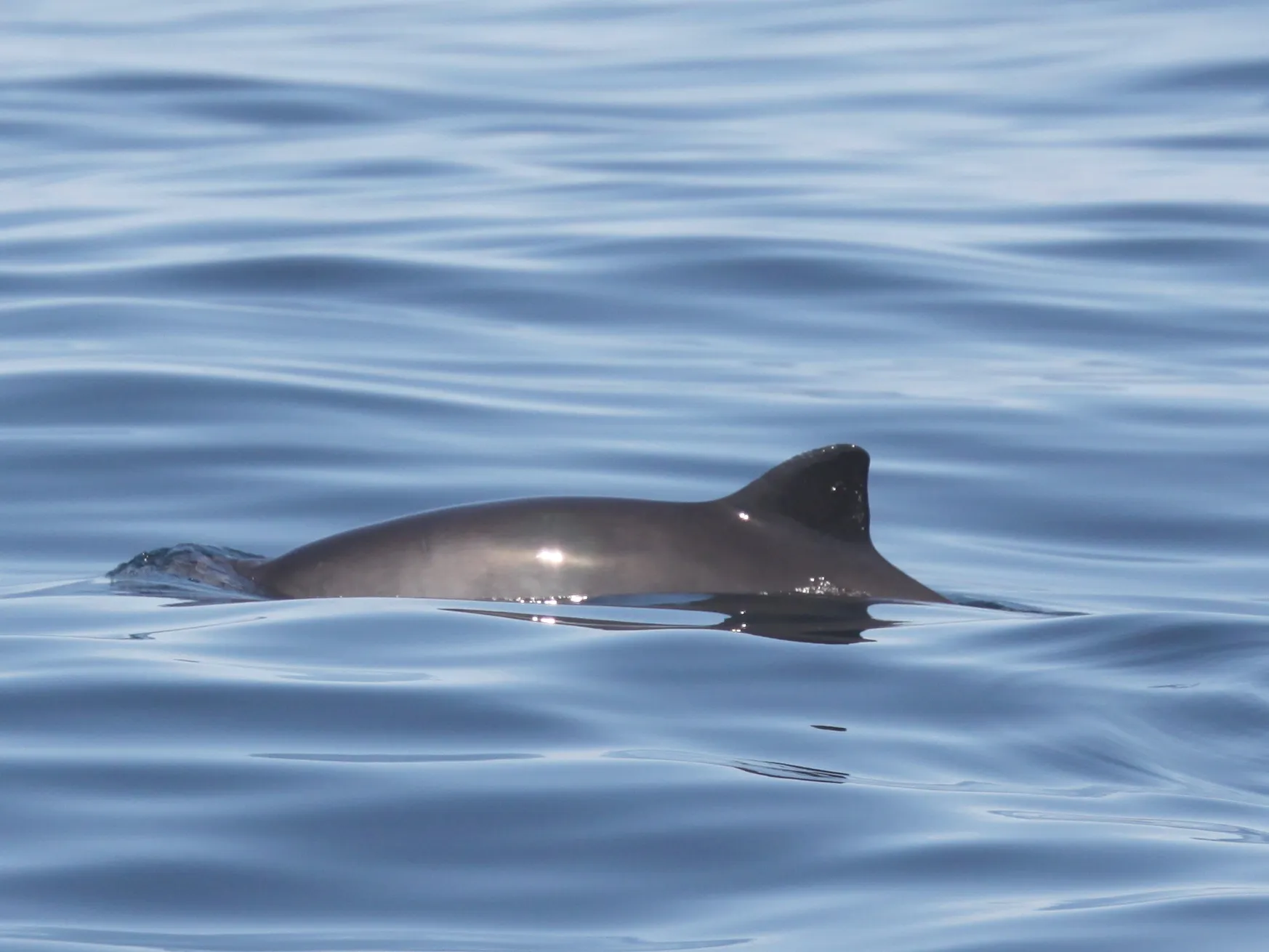
Image credit: Niki Clear, Manx Wildlife Trust
And there’s a lot more possible encounters out there during this time of year, says Matt.
“Summer and autumn is also when ocean dwellers that like warmer water venture into Cornish waters.
“In the last six years we’ve also started seeing Atlantic blue fin tuna. They can reach two metres in length and can be seen when they’re coming to the surface to catch their prey,” Matt continues.
Another oceanic visitor is the leatherback turtle. “It’s the largest turtle species in the world. It has a soft shell and feeds on jellyfish. In a summer when we have a lot of jellyfish visiting, you have the most chance of seeing them,” explains Matt.
Matt says that seals are also thriving in Cornish waters, and during this time of year pregnant females, feeding on large amounts of fish, will stretch out in the sun to warm up.
“This helps them digest all the food they’re taking on for their pups. By late summer and early autumn they find secluded, peaceful coves to give birth.”
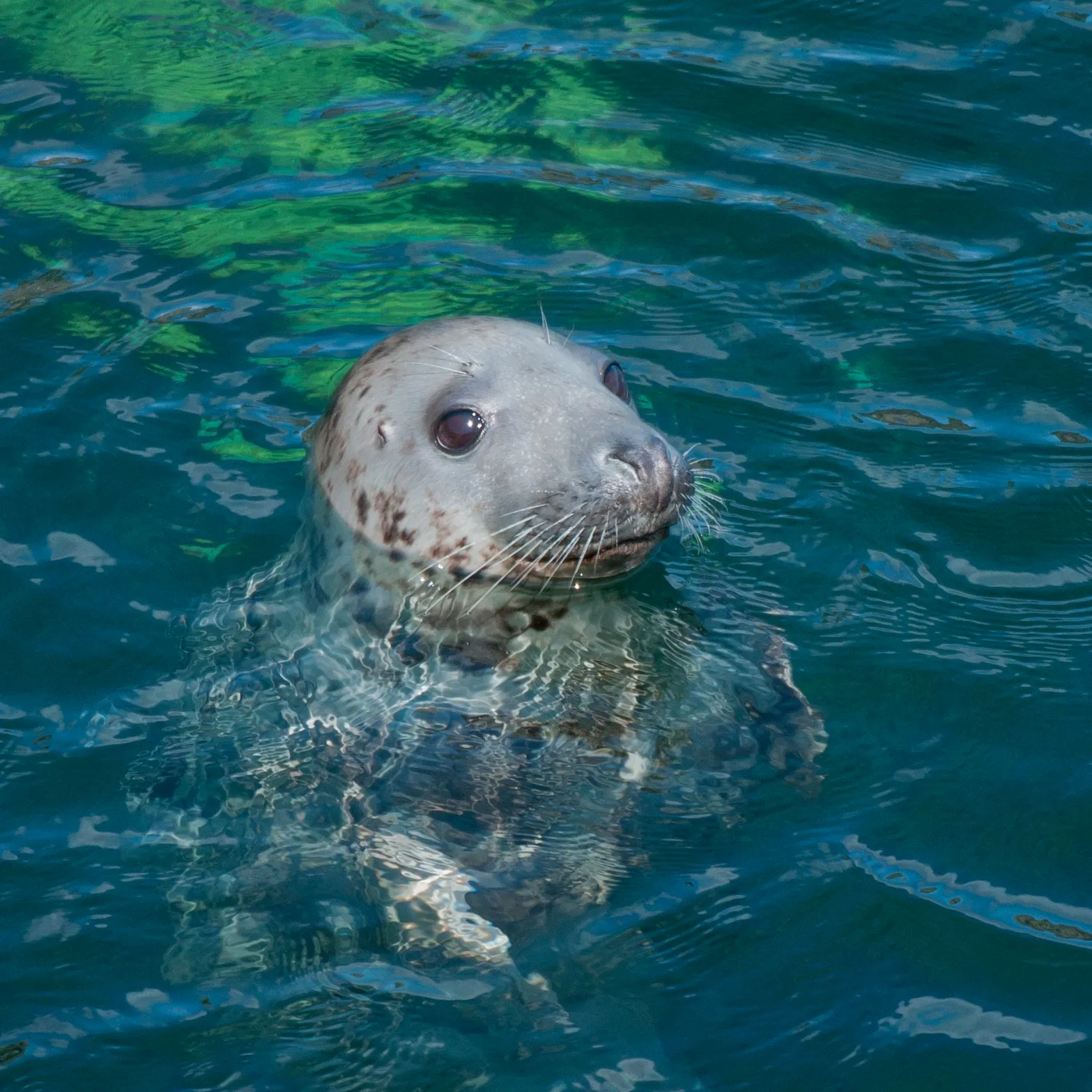
Image credit: Caz Waddell
Into winter and spring, while warm water visitors are absent, it might be the time to spot something bigger.
“We can also be visited by whales; the commonest is the minke whale, but we’ve also had records of much larger whales. If you’re out spotting wildlife in winter you could be extremely lucky and see a humpback or fin whale,” says Matt.
With so much wildlife hunting, nesting and travelling through and around the Cornish coast it’s vital we keep them safe and help them to thrive.
Taking a guided tour to find wildlife helps ensure you’re respecting the animals you see and causing little disturbance. Often that’s about keeping your distance and using binoculars rather than trying to get too close. You can find out more about what to do via the Cornwall Marine and Costal Code.
If you’re visiting with your dog, it’s best to use a lead when walking near sea birds, advises Matt. Birds can be frightened and cliffs can be perilous for pets. During spring, dogs should avoid disturbing the ground-nesting skylarks that have their home in cliff-top habitats.
“If you do come across a seal on a beach or rocks, it’s important to keep dogs far enough away and on a lead to avoid disturbance or risk of injury,” says Matt.
While some beaches have restrictions on access for dogs during the summer, other beaches do not and there’s times at the beginning and end of the day when dogs are allowed on most beaches.
“Well behaved dogs are fine to be off the lead on the beach,” says Matt, “but you need to have good recall if you do spot wildlife so a dog can quickly be put on their lead.”
As we experienced, there’s an abundance of natural wonders out there to be found, with a little patience and luck on your side. And knowing what to do when you are lucky enough to encounter marine life helps make for a thriving coastal habitat.
All around the coast you can find wildlife spotting tours with good practices for limited marine disturbance.
Find out more about Coast Boat Trips and Cornwall Wildlife Trust’s marine conservation work. You can also visit the Cornwall Marine and Coastal Code website for more on caring for the marine life when out and about along the coast.
Browse our West Cornwall retreats, where you’ll be close to this thriving area of sea and wildlife.
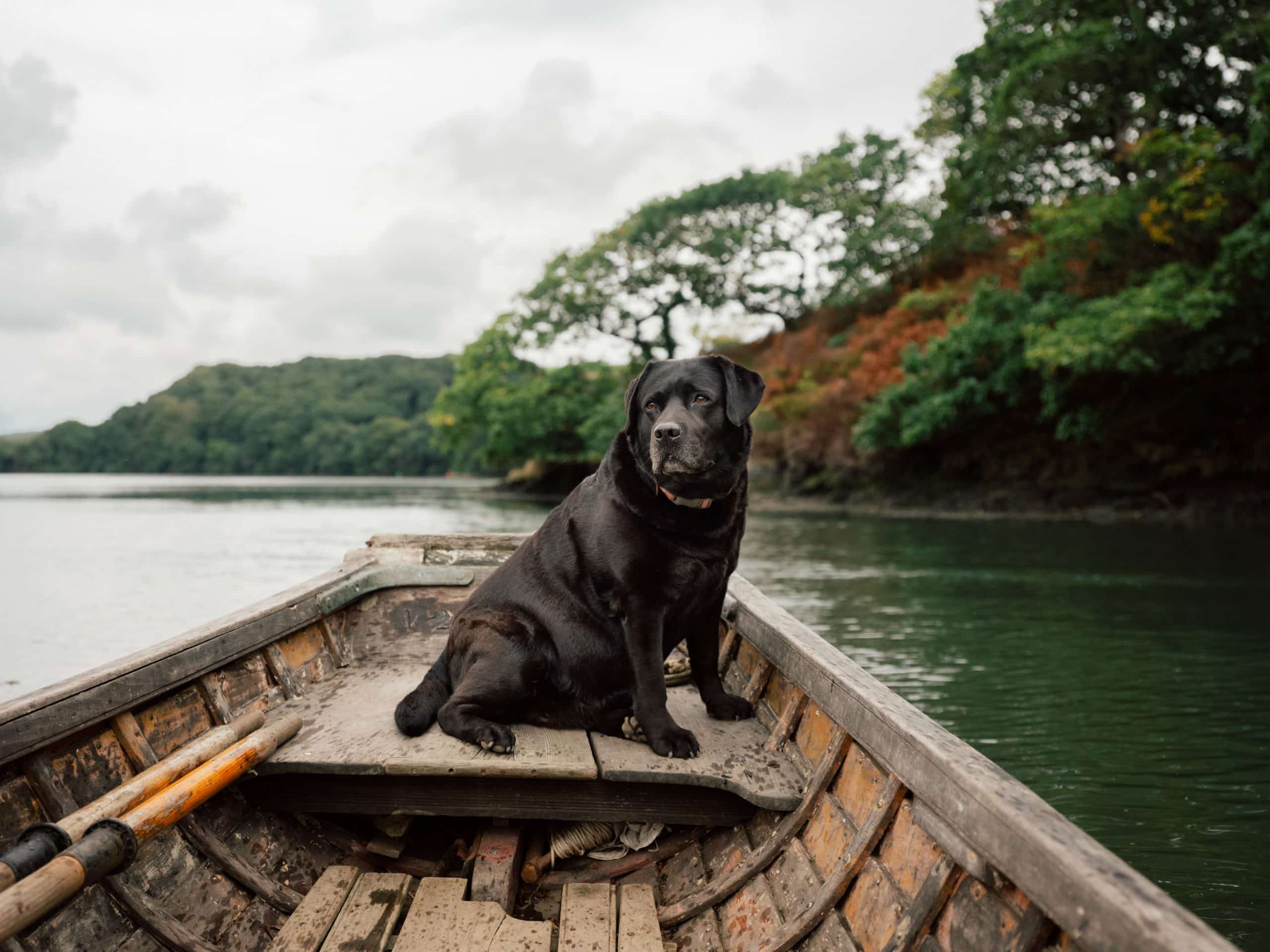
Some dogs prefer running through sand, others can’t wait to wade in for a swim and then there are some dogs that love spending time at sea aboard boat or board. We captured three dogs at sea on their preferred craft…
Find your dog friendly holiday.
Visiting with a large group? Discover our large holiday homes perfect for big families or friend groups.
Meet Rosie, a crew member at Clean Ocean Sailing. Rosie is happy to leap overboard to gather plastic waste floating out at sea or on the coastline. Her love for the water is such that she once did just that in the Bay of Biscay, fortunately returning to her vessel after an hour of searching.
When it comes to boats, she is as comfortable in the century-old Scandinavian rowing boat pictured here as aboard the main Clean Ocean Sailing vessel The Anette, collecting the plastic material that pollutes our seas or transporting that gathered and sorted waste to Exeter where it is processed and turned into new objects.
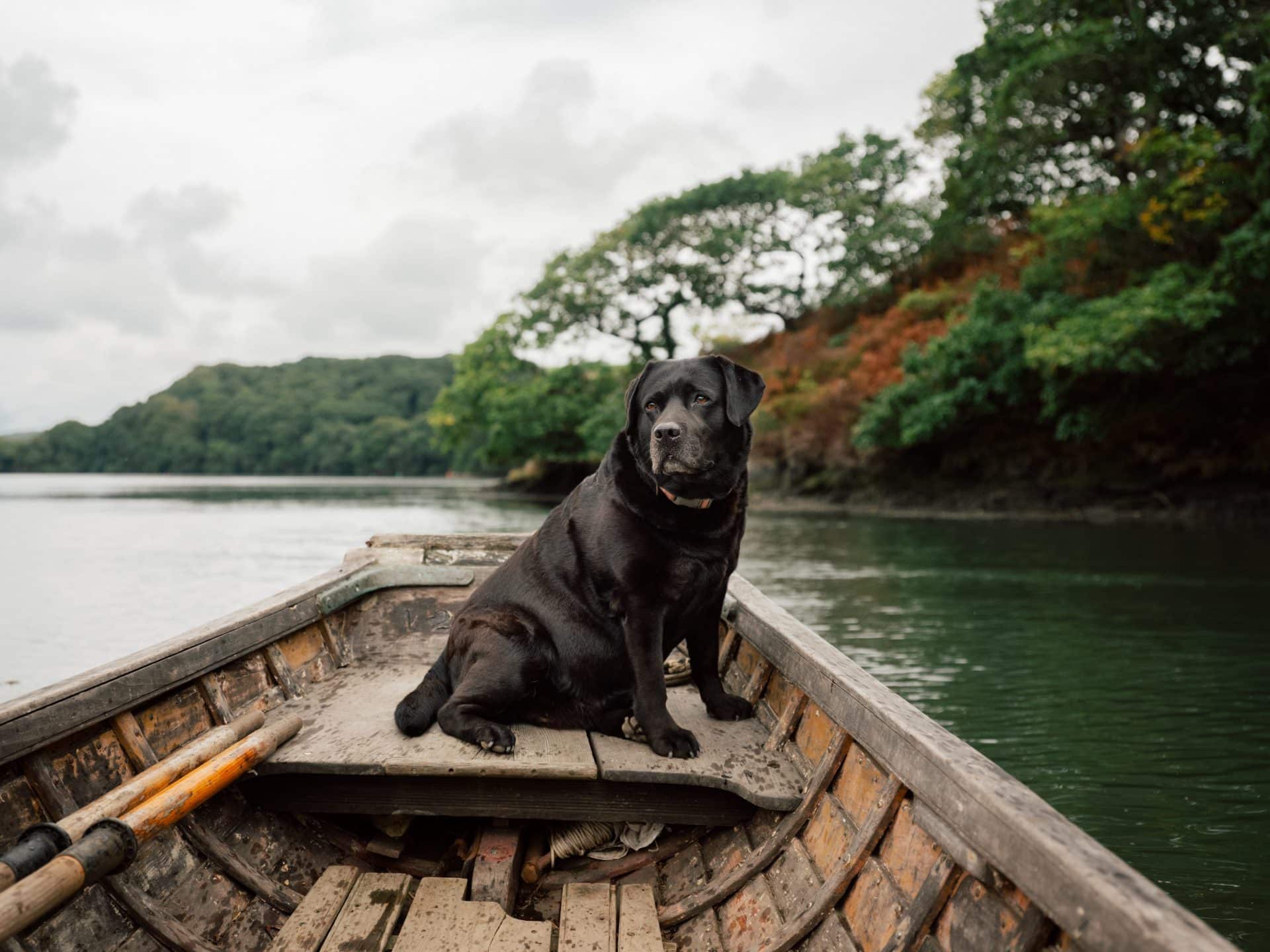
Support the work Rosie and her owners Monika and Steve are doing, and find out about volunteering opportunities at Clean Ocean Sailing.
Few dogs have overcome and achieved as much at sea as Toobs. She not only swam to safety in a cave after being lost at sea (making local and national news headlines) but managed to swim the English Channel in 2020 over a number of swimming stints. Here she is aboard her sailing boat and home, moored in Falmouth, on which she is about to embark on an epic sailing tour with owner Wayne. And below Toobs is enjoying a regular dip in the water between harbour and mooring.
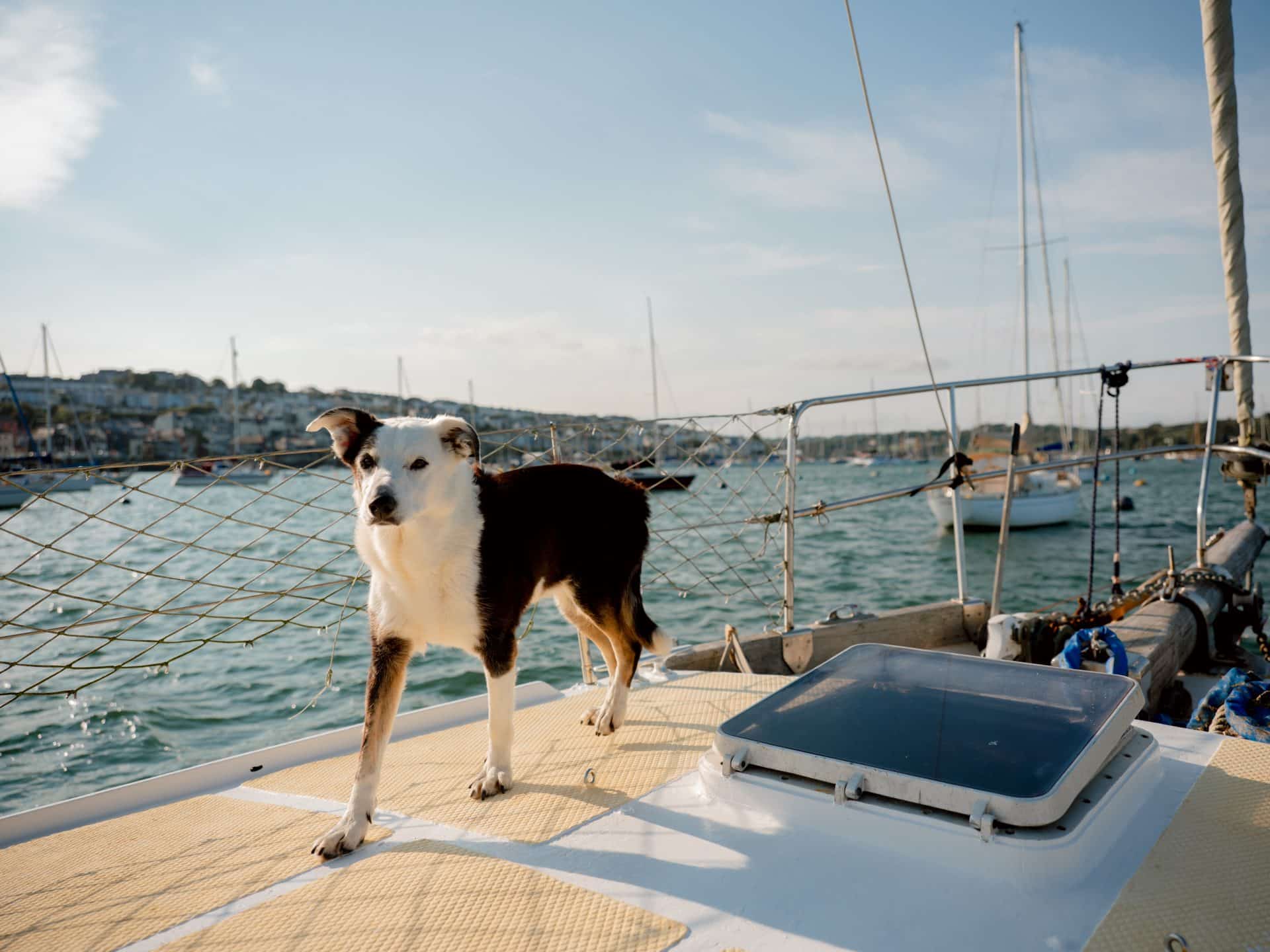
You can follow Toobs’ adventures at sea at the Team Toobs website and on Instagram.
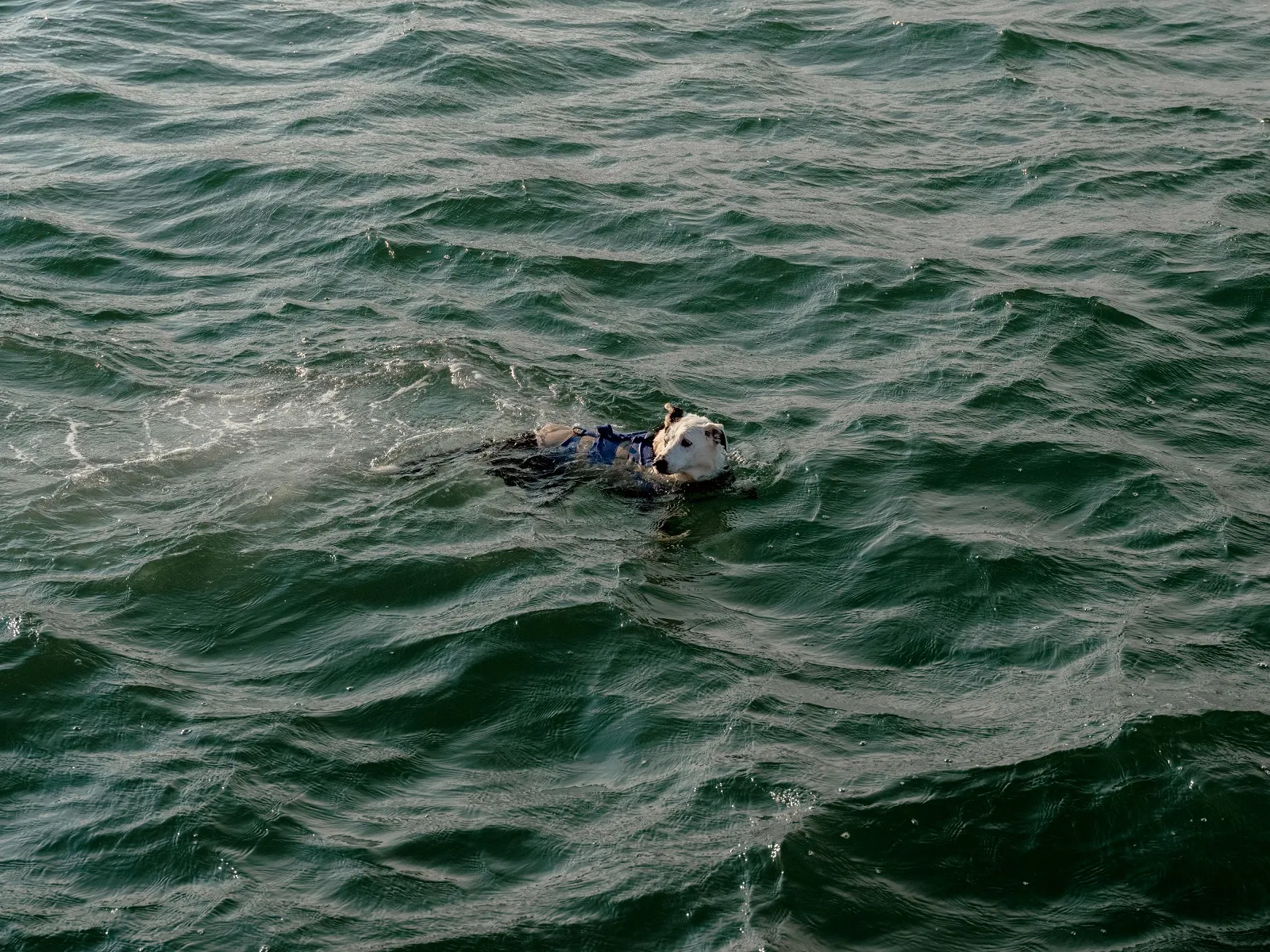
Not all seafaring dogs live on or even near the sea. Ted, who hails from Loughborough in the Midlands, recently visited Cornwall on holiday where he enjoyed several trips on the paddleboard with owner Amy. Not only does Ted frequent a paddleboard, he goes out kayaking and on land-based adventures in a bike carrier. When he’s looking less alert and his ears are back, Amy knows he’s really relaxing into the boarding.
Want to explore Cornwall and stay in Fistral? Have a look at our luxury holiday cottages in Fistral.
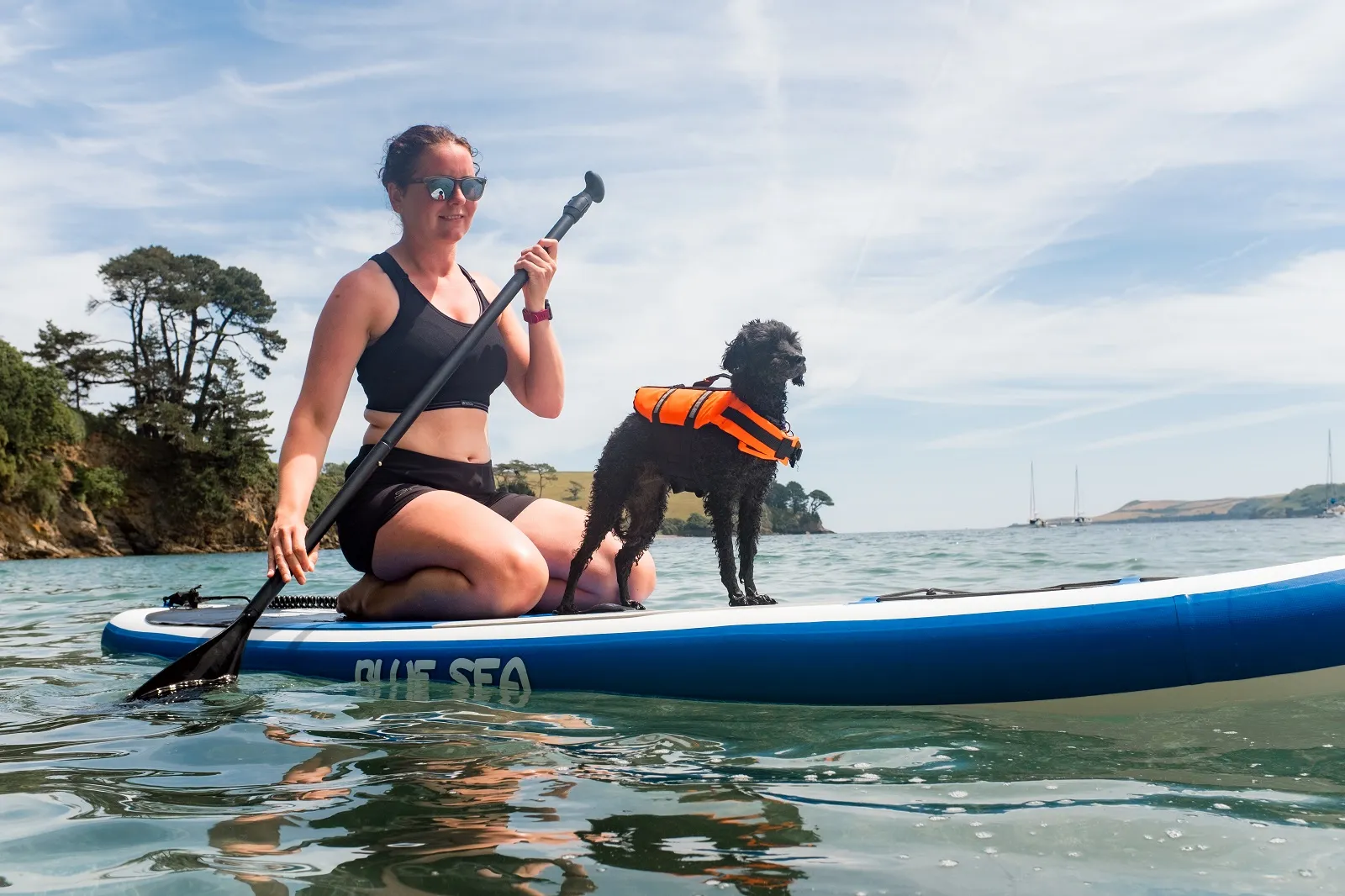
Choose from retreats around the coast with enclosed outside spaces for four-legged friends to relax post swim and outdoor showers for rinsing off all that salty sea water. Whether sand runner or wave paddler, or both, bring your dog to beach.
Discover Cornwall’s finest dog-friendly beaches for your furry friend to roam and play.
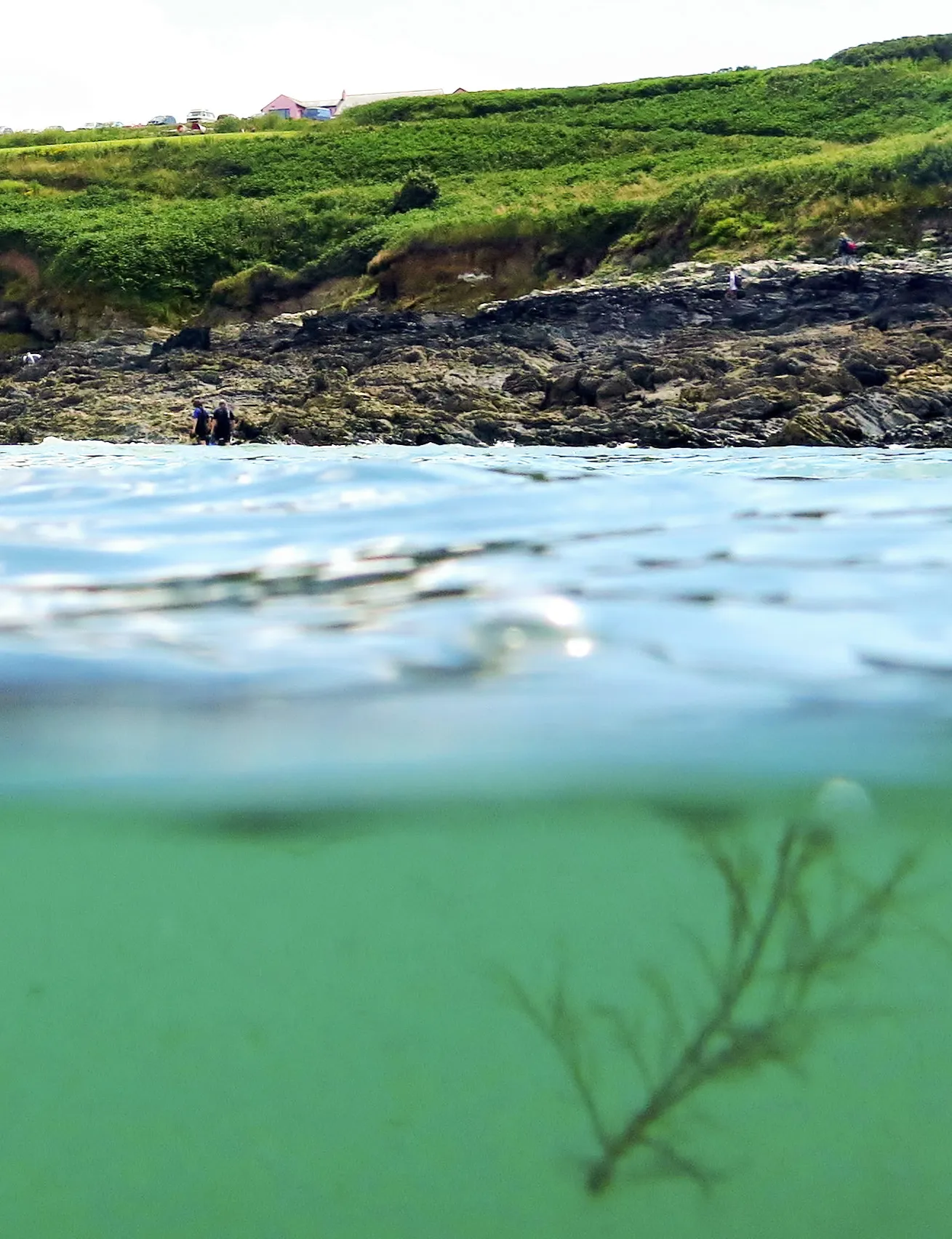
Among the slippery rocks and swaying seaweed of Cornwall’s many coves and rock pools lie bright colour shows and surprising shimmers of pinks, yellows and greens. From cunningly disguised crabs and solar-powered slugs, to UV discoveries and night swims in a sparkling sea, we talked to rock-pooling expert Heather Buttivant about what to look out for…
The coastal waters of Cornwall are micro worlds of amazing creatures and plants in a collage of colour that isn’t always obvious, but can be a dazzling discovery for any intrepid beach explorer.
Want to stay in a luxury holiday house with a view of the sea? Check out our cottages with sea views.

Image: Crantock, Cornwall by Hydro Motion Media
“I grew up on the north coast of Cornwall and spent a lot of my childhood on beaches,” says Heather. “I was always completely fascinated by the weirdness of that world, and by the colours. Collecting shells was a massive thing as a kid, and I’ve returned to it as an adult. It’s become my world again.”
While she isn’t a formally trained marine biologist, through courses and working alongside experts, Heather has developed an expert eye and brought this to her enthusiasm for rock pools. She posts about her discoveries at the Cornish Rock Pools website, and has written two books Rock Pool: Extraordinary Encounters Between the Tides, and Beach Explorer: 50 Things to See and Discover.
“I wanted to share my excitement about all of this marine life with people who aren’t scientists,” she explains. “It seemed to be a gap; there was very little around that was designed to tell people about our fascinating marine life – especially the marine life we have around Cornwall.”
Check out our other locations and other retreats across North Cornwall.
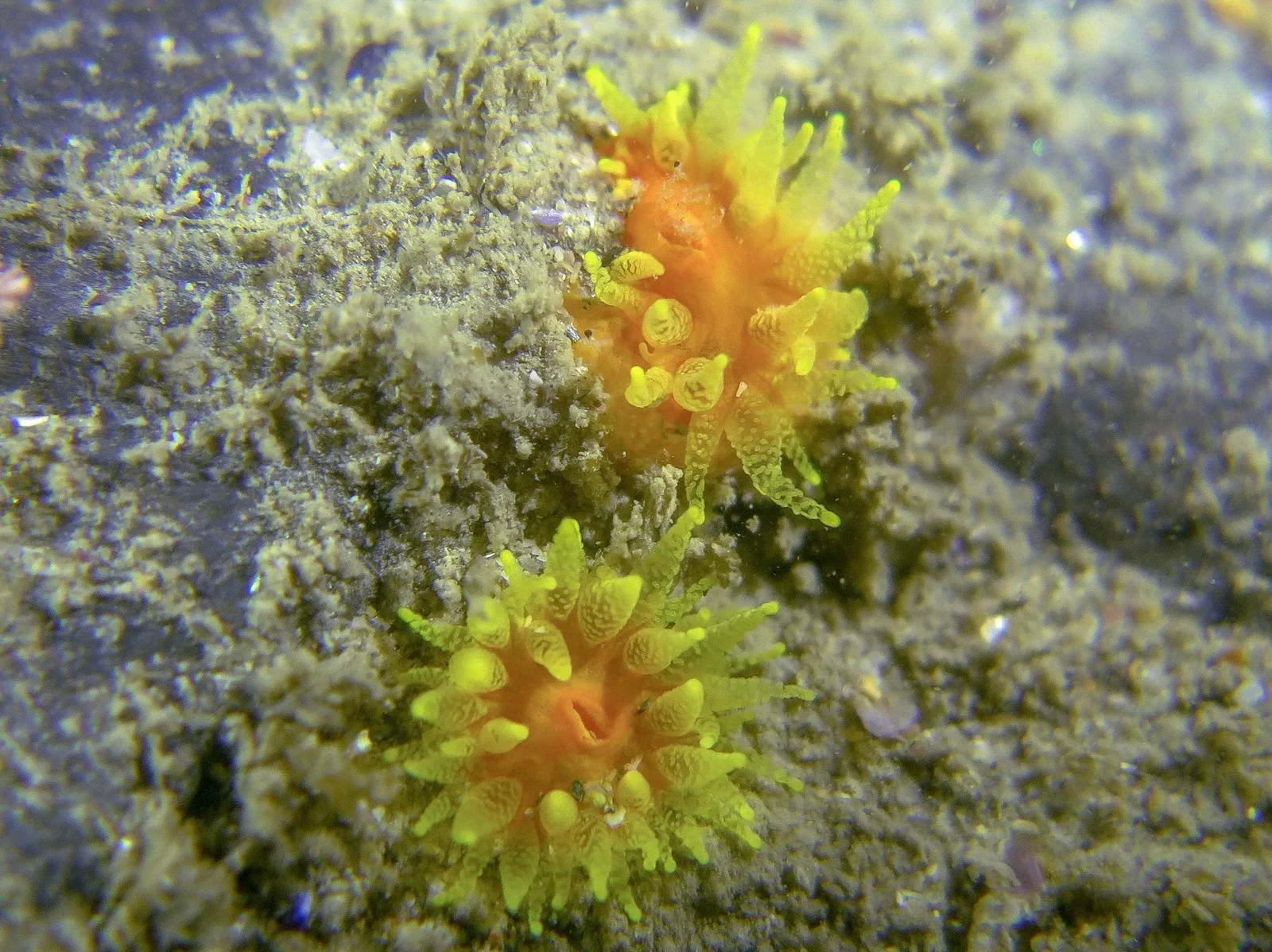
Image: Scarlet and gold star coral (Balanonphyllia) by Hydro Motion Media
Striking colours can be uncovered just below the surface, from brightly coloured anemones – like “the wonderful strawberry anemone” – to yellow and orange cup corals, “the jewels of the rock pools”.
“We also have a massive variety of seaweeds that come in a huge range of colours, from reds to browns to greens,” she continues. “My favourite to show children is rainbow wrack; in the water it’s the most wonderful iridescent turquoise colour. But out of the water it just looks a dull green-brown.”
If you’re exploring deeper rockpools or have a mask and snorkel to hand, many species of fish can be found close to the shore. The corkwing wrasse builds its seaweed nest just offshore, while the young of the larger ballan wrasse – also sometimes seen in rock pools – are a bright emerald green.
Another fish you might catch sight of in shallow waters, pouting or bib, is a deep coppery colour with three or four vertical bands that shimmer in the light shining down through the water. They like mixed rock and sand habitats, as well as ship wrecks.
Discover more of Cornwall with our favourite places to watch the ocean and go sea spotting.
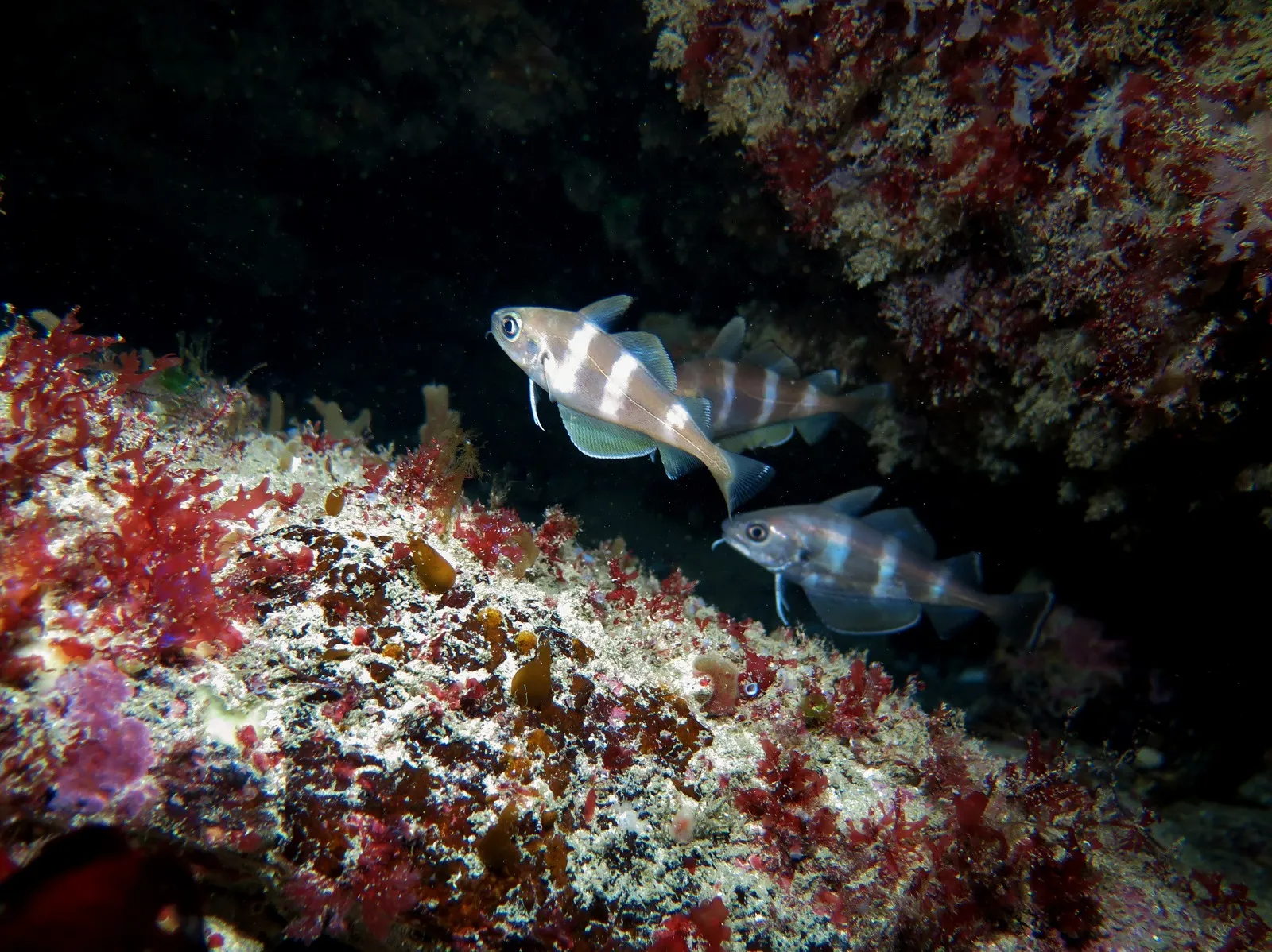
Image: Pouting (Trisopterus luscus) by Hydro Motion Media
They might not sound like the most appealing discovery, but unlike their garden-dwelling namesake, sea slugs actually take on an infinite variety of colours. They’re not easy to find, but if you’re lucky to discover one you may be surprised at these “tiny beacons of yellow, green, orange, purple or red” – “It can become an obsessive hunt,” says Heather.
Like their fellow rockpool creatures, sea slugs are often coloured to match the seaweed, rocks or encrusting animals in their habitats – and will change colour as it goes, or after a meal. “The great grey sea slug feeds on anemones; after it’s eaten, it’ll turn the red or pink of the anemone it’s just eaten – and also retain some of its stinging cells, keeping them as a defence on its back,” Heather explains.
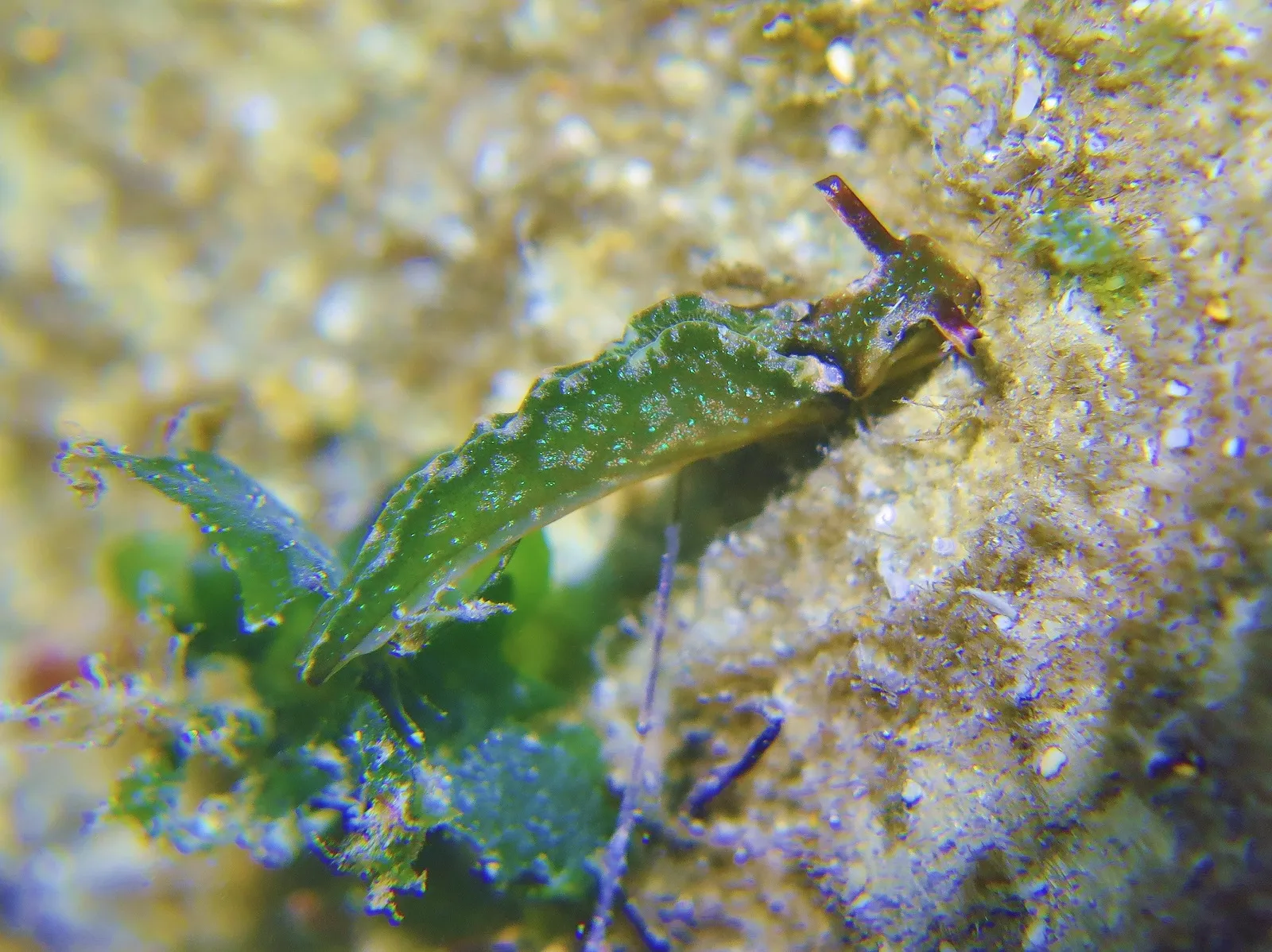
Image: Solar-powered sea slug (Elysia viridis) by Hydro Motion Media
Some species of crab also take to wearing their habitat, by attaching pieces of sea sponge to their shell and limbs or using little ‘Velcro-style’ hairs to drape themselves in seaweed. “They just look like another rock covered in seaweed until they get up and run off,” says Heather.
A lot of sea creatures are more active at night, so a rock-pooling expedition by torchlight may reveal more than on a sunny beach afternoon – with an added sense of adventure to boot.
Along Cornwall’s south coast, it’s also possible – though rare – to see the bioluminescence (also known as sea sparkle and phosphorescence) created by planktonic algal blooms, shining out from the water. Nothing beats a night swim (stay safely within your depth) under the stars above, with the sparkling sea glinting between your fingertips as you stroke through the water below. These areas of phytoplankton are naturally occurring, generally in mid-late summer or early autumn, and are not harmful to the coastal environment.
A far more common phenomenon revealed by an ultra violet (UV) light (if you happen to have one, or join an organised tour) is the fluorescence that specific marine life creates by re-emitting sunlight at a different wavelength. The snakelocks anemone shines neon green under UV light and some species of crab appear blue.
“Just take the time to go slowly, look closely at pretty much any rock pool and you’ll start to notice the animals there,” Heather recommends. “But bear in mind that these things are quite well hidden!”
These creatures are best observed in their natural environment, so resist the temptation to catch them in a bucket if you can – or at least make sure your bucket is full of seawater, and that you put them back in the same place you found them before you leave. Animals can also be easily injured, so avoid using nets if possible.
“Prawns and blennies will swim over to have a look if a camera is in the water, and it’s not that unusual to see two hermit crabs having a fight,” notes Heather. “These things are absolutely fascinating to watch.”
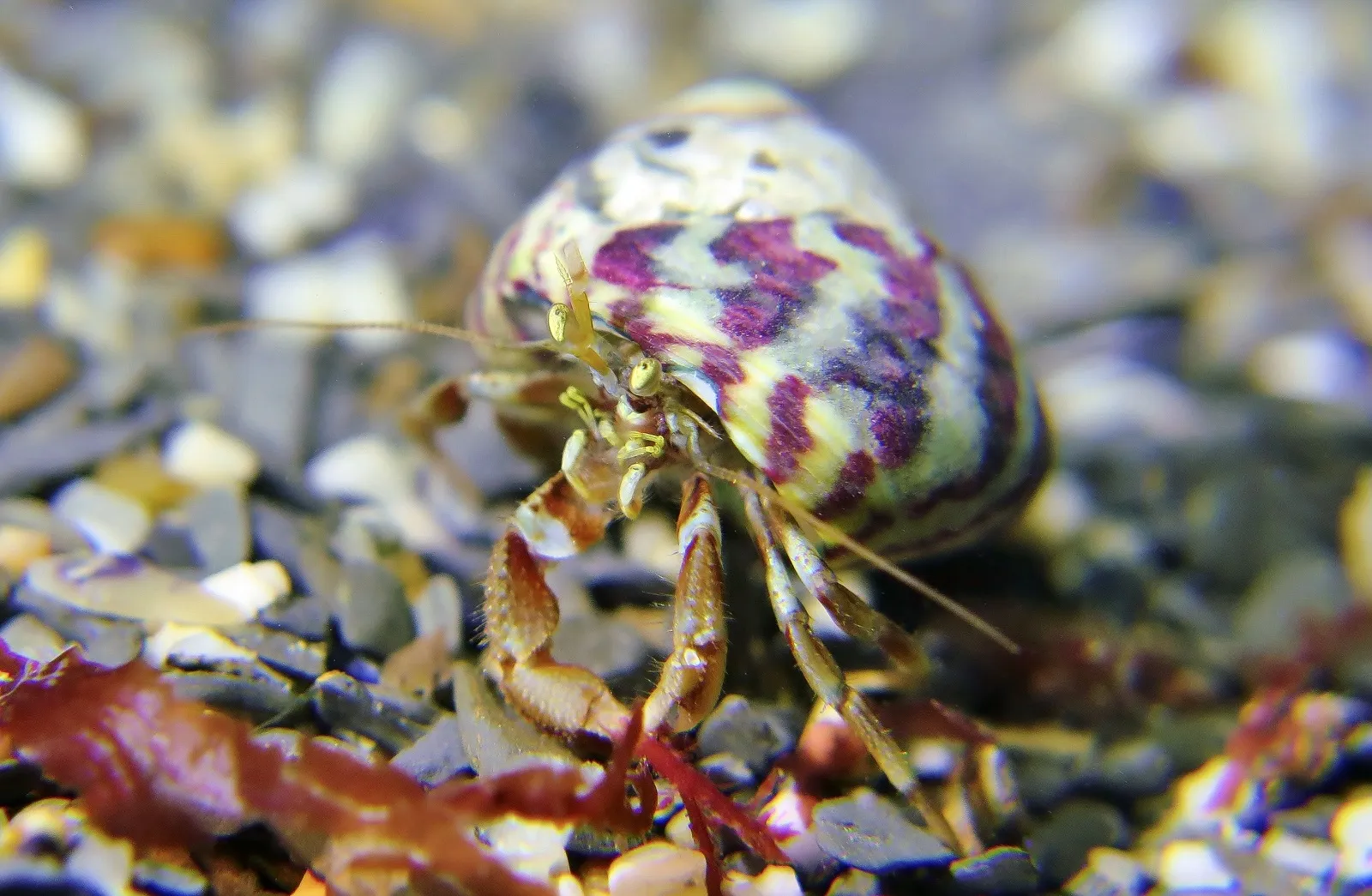
Image: Hermit crab (Pagurus bernhardus) by Hydro Motion Media
One of the best ways to make discoveries is to join a tour. The Cornwall Wildlife Trust organises beach events throughout the year, and there are also local conservation groups running rock pool activities across Cornwall.
Find tips on Heather’s website, and pick up a copy of her books in bookshops around the county and online.
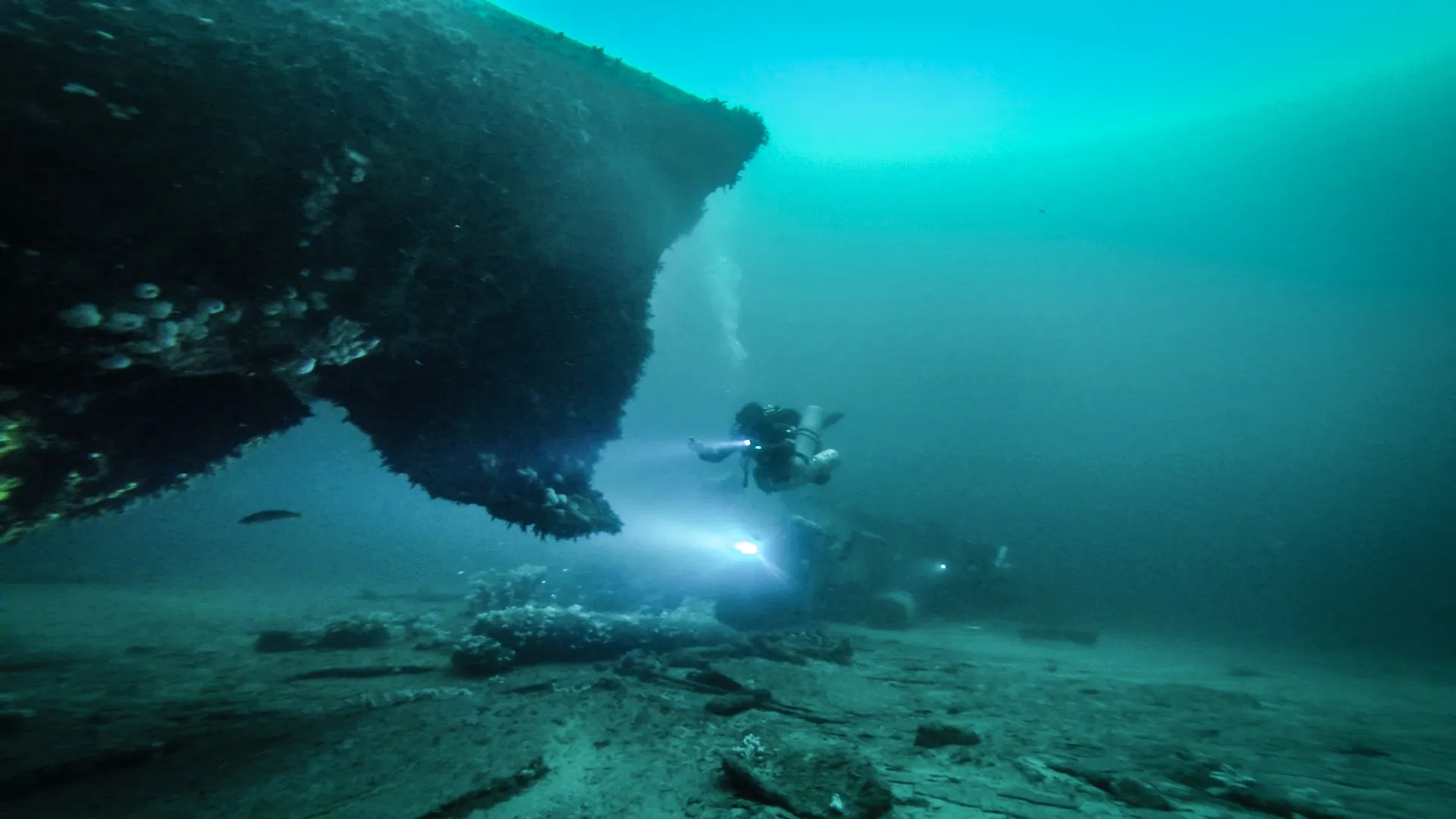

Image credit: Dive Newquay
Read three perspectives on the sensory power of the sea, from deep sea diver to experienced mariner to wild swimmer…
Throughout time and place, the sea has had a powerful effect on humans. Its dazzling forms and mysterious depths have seeped into culture, enchanting, thrilling and calming at once.
Whether the crash of the waves on the beach or the glow of the red sun rising over a rippling cove, it’s impossible not to feel the effects of the water.
Visiting Cornwall for a romantic adventure? Check out our romantic cottages.
Jack Carter from Boscastle sought out solace in the sea during the height of the Covid-19 pandemic when his first child was born. He opened his own marine touring business to combine his love for both boats and the Cornish coast. Despite these potentially stressful demands, he said “I just can’t seem to be stressed when I’m working at sea every day. For me, it’s the environment I relate to best; I’m in my element.”
Jack has spent 15 years at sea and some of his favourite moments are witnessing storms, describing feeling both humbled and charged by the water’s immense energy and power. Experiencing the emotions the sea can inspire was behind Jack’s decision to set up Coast Boat Trips.
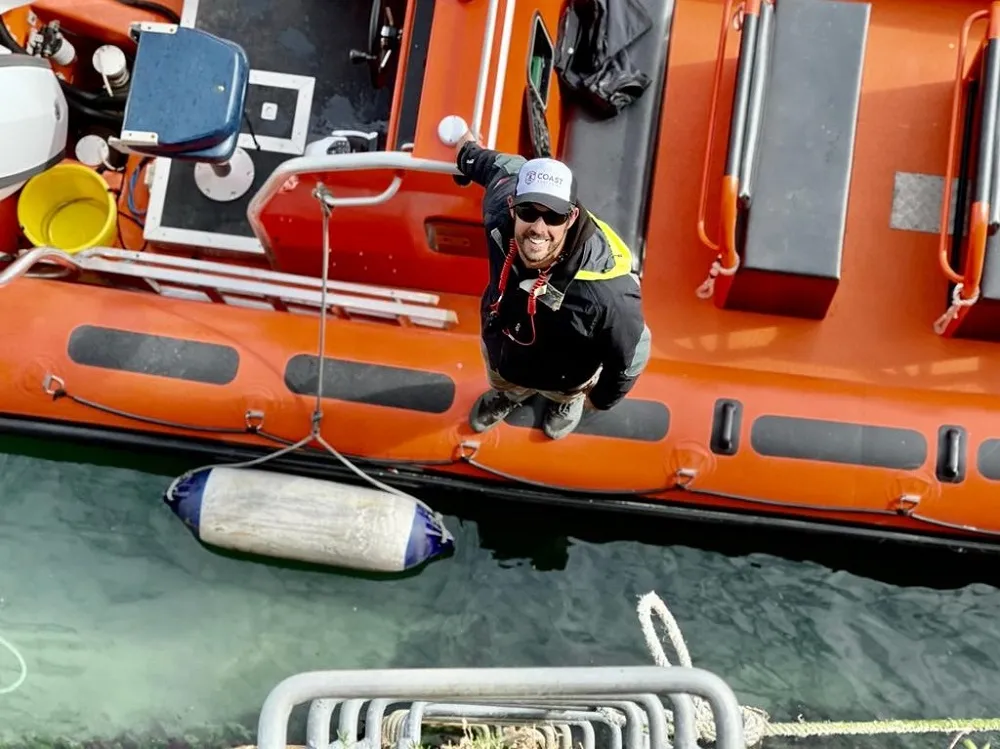
Image credit: Coast Boat Trips
“We do the tours between Lands End and Cape Cornwall; it’s a really unique area of coastline. The word ‘cape’ literally means where multiple water bodies collide. So here, there’s the Irish Sea, the Atlantic and the English Channel, creating some of the world’s biggest tides ripping through the area, along with crazy currents and tidal waves. The area is just so dynamic.”
“And when you’re out on the boat you can also see the cliffs from another angle and they’re dramatic and incredible in themselves. It’s where an immovable object meets an unstoppable force.”
From thrills above the water to the mystery below, Joe Gurney has been working as a scuba dive instructor at Dive Newquay for the last eight years. He describes the sensation of diving as “weirdly feeling as if you’re flying down there.”
While beginners dive to 10m, Joe recently went to 65m in his deepest dive yet. He was aiming to explore one of Cornwall’s 3000 shipwrecks, a ship that sank to the seafloor in 1888 after crashing into the headland near Fistral beach in Newquay.
Want to stay in Newquay? Have a look at our luxury holiday properties in Newquay.
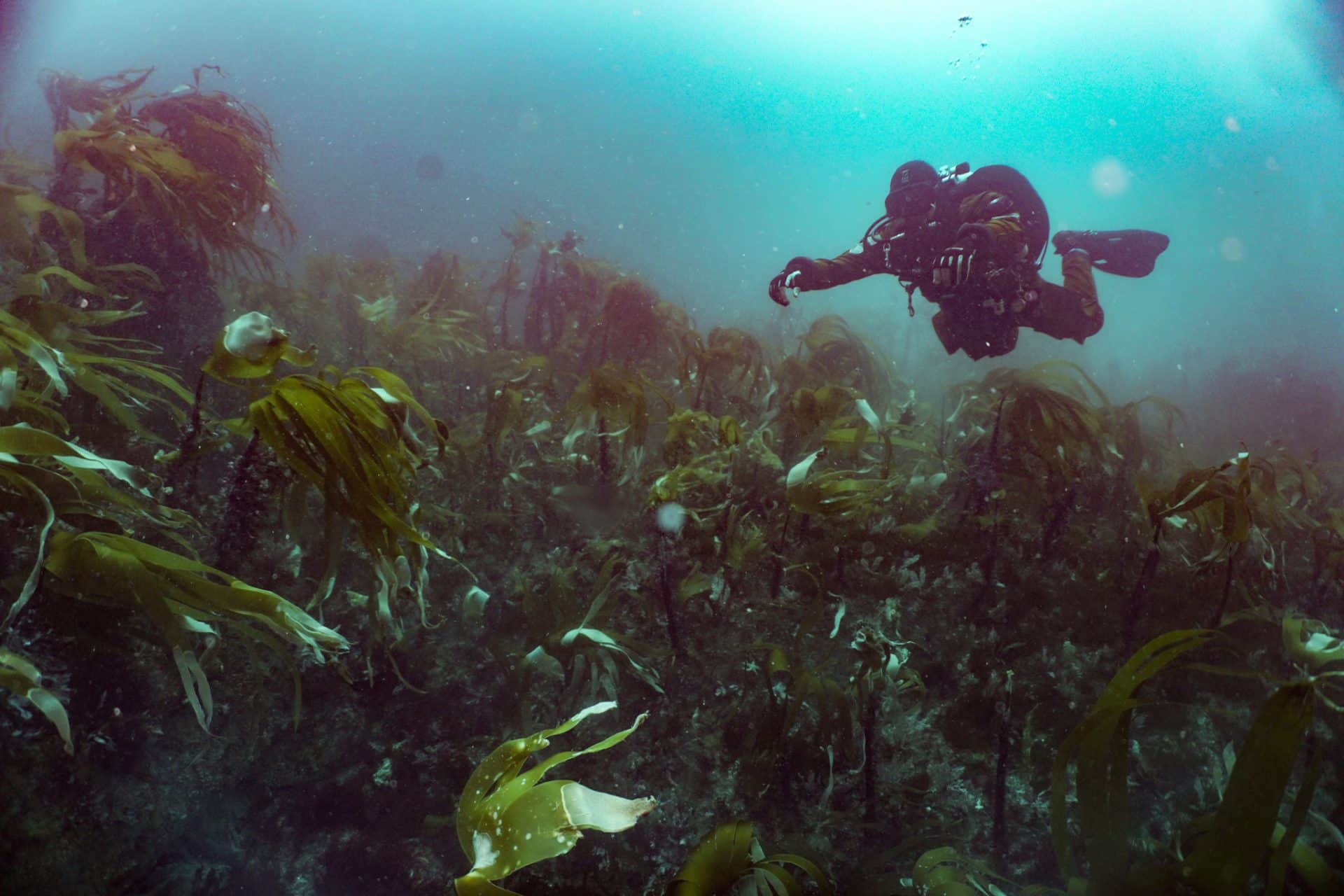
Image credit: Dive Newquay
“Shipwrecks are kind of mysterious, especially if there’s lots of plankton it can be pitch black. But it’s like a whole different world and there’s so much marine life sheltering in the wreck, as well as different types of coral that you just wouldn’t see in shallower waters.
“The UK is pretty underrated I think. If you get a clear day, with the sun coming in right, the water is turquoise blue and everything is illuminated on the coral, it’s just amazing. I’ve also had dolphins doing somersaults in front of me and an inquisitive seal nibble my flipper.”
The effects of exploring the depths are clearly visible for those who try it. “Everyone who comes up from their first dive is beaming from ear to ear,” says Joe.
Lydia Paleschi believes cold water has a healing effect. A founder of Wild Swimming Cornwall and author of ‘A Guide to Wild Swimming in Cornwall’, she swims without a wetsuit all year round, come rain or shine. She said: “The sea has always been a backdrop for me growing up, but it wasn’t until I left Cornwall that I realised how special it is and really started to crave it. When I went through a rough patch with my mental health, I found coming home and going swimming really, really helped.”
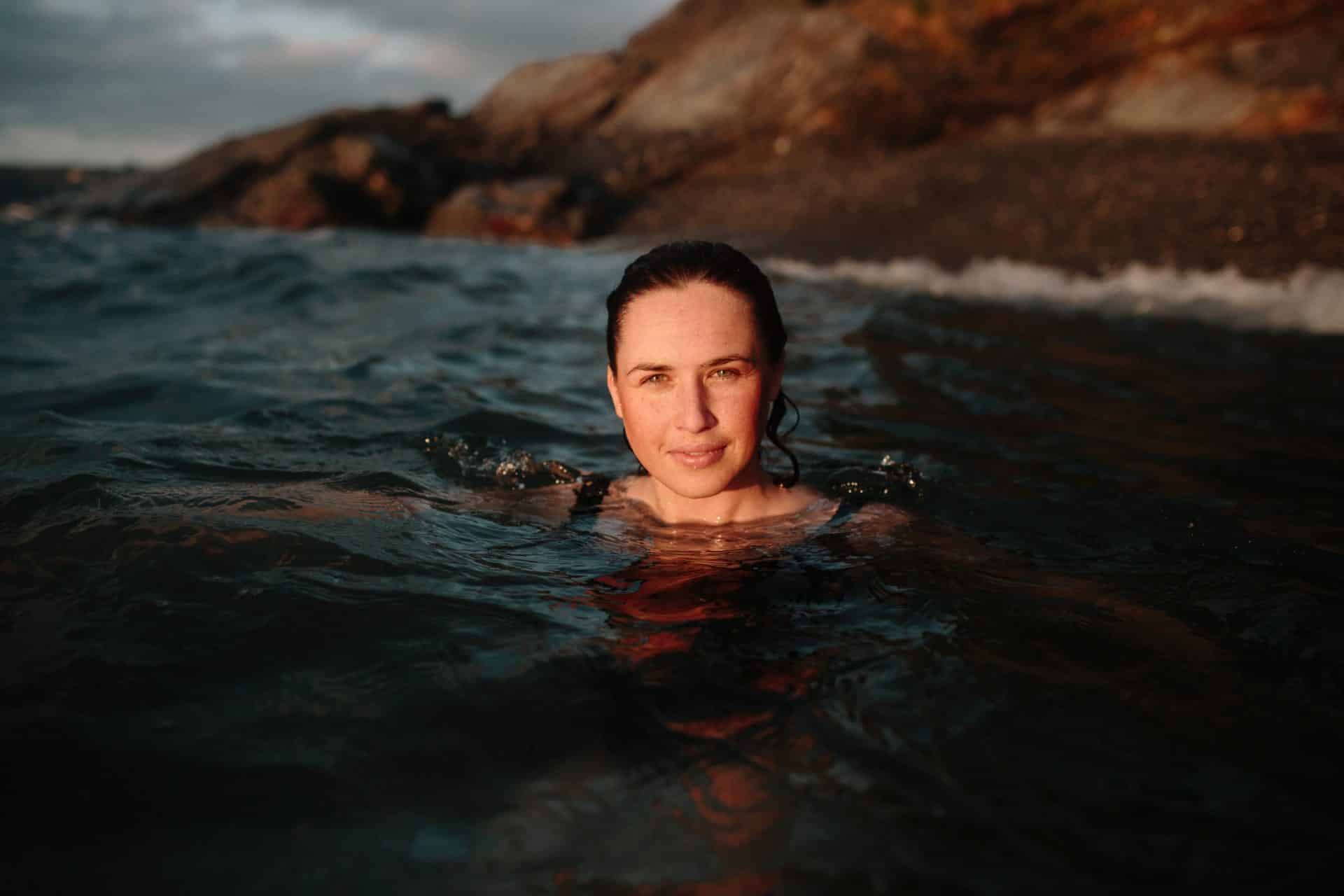
Image credit: Wild Swimming Cornwall
Lydia describes being in the sea as a type of therapy that brings many other feelings, from creative inspiration to the feeling of being part of a community. She explains how cold water swimming has a physiological reset effect, as blood rushes from the brain to warm the core.
“I love to sea swim after a run because of the explosion that happens on your skin with all your nerve endings being activated. Each time you go in, you build your confidence and feel proud of yourself; I call it my arena for confidence building.
“But, at the same time, it’s my playground, where I go to connect with my inner child, whether that’s snorkeling, seeing different animals or splashing around with friends.”
Like a reflection, the sea can be something different to everyone. Whether you’re after a new thrill, a sensory overload or a peaceful escape, there is something for you in the sea’s wonderful expanse of possibility.
Discover the best dog-friendly beaches in Cornwall, where your furry friends can enjoy the sun, sea, and sand alongside you.

A sonic postcard from Cornwall. The sounds of the sea, beach and cliff top captured during an idyllic morning at Godrevy, as we ventured out for a surf.

Welcomed by swooping sand martins and the lilting trill of skylarks over the wild fields.

Board waxed, wetsuit zipped and leash attached; inviting waves await…

The walk to the beach crosses the Red River as it flows towards the ocean.

Time to greet the waves….
Looking out to Godrevy Lighthouse and the ocean beyond, the headland at Godrevy, near Hayle, is a wildlife haven – home to ground nesting birds, small mammals, rare invertebrates and spectacular coastal plants – while below lies an oceanic playground, all waiting to be explored.